Home > Tourism > GITM 2024: Goa Tourism Future Shaped by Insightful Discussions

GITM 2024: Goa Tourism Future Shaped by Insightful Discussions
- Goa Prism Team
- Published: April 5, 2024

The conclusion of GITM 2024 marked a pivotal moment in the discourse surrounding the future of tourism in Goa, as stakeholders engaged in robust deliberations and constructive dialogues aimed at elevating the state’s status as a premier destination.
On the second day of the event, esteemed panellists including G B Srithar, Carl Vaz, Jack Ajit Sukhija, and Ajay Prakash, among others, convened for insightful discussions. Suneel Anchipaka, IAS, Director Tourism & Managing Director GTDC, lauded the event’s role in fostering innovation, collaboration, and sustainable growth. He expressed optimism for the future of Goa’s tourism industry, buoyed by the enthusiasm and momentum generated at GITM.
Key panel discussions delved into innovative strategies for branding and promoting tourism in Goa on a global scale. Emphasizing the importance of a comprehensive branding strategy, experts highlighted the need to attract conscientious travelers and foster sustainable growth.
Another session explored Goa’s potential as a high-yield destination, emphasizing its ability to offer economic returns and cultural dividends. Insights were shared on leveraging Goa’s natural beauty and capitalizing on emerging travel trends to attract discerning travelers.
Furthermore, discussions centered on the development of skills within the tourism sector in Goa. Experts underscored the importance of workforce training and capacity building to ensure long-term sustainability and excellence in service delivery.
The event witnessed the convergence of over 500 buyers and 300 sellers, facilitating fruitful discussions and negotiations. With over 3000 meetings held, the event showcased promising business prospects estimated at over 10 million Dollars, highlighting its significance in driving economic growth within the tourism sector.
As GITM 2024 drew to a close, attendees departed with renewed enthusiasm and determination to propel Goa’s tourism industry to greater heights. Armed with innovative ideas and promising collaborations, stakeholders remain committed to sustainability, inclusivity, and excellence, positioning Goa as a prominent player on the global tourism stage.
Sign me up for the newsletter!
A Step-by-Step Guide to Convert Word Document into PowerPoint Presentation Using Copilot

A Beginner’s Guide for Choosing the Right Car Insurance

Rahil Parikh: Pioneering Privacy-Preserving AI for a Safer Digital Future

Senior Couple from Mumbai Drowns at Goa’s Candolim Beach
Related articles....

Goa Coastal Zone Management Authority Approves Establishment of 364 Beach Shacks with Stringent Environmental Conditions

Government Signs MOU with Temple Connect to Boost Spiritual Tourism in Goa

Preserving the Past: Corjuem Fort Emerges as a Beacon of Heritage Tourism

Ayush Visa For The Tourists Visiting India For Medical Tourism

Hotel Industry Resumes Back With The Drop in Covid Cases In Goa

Goa Seeks Financial Assistance From The Centre To Revive Tourism Affected by COVID

We Want Tourism Board On The Lines of Singapore – TTAG

Domestic Tourist Influx During Long Weekends May Have Benefits For Goa

Goan Locals Report a Party At Morjim, The Hotel Owner and A Russian National Held
Subscribe to newsletter.

- Entertainment
PARTNER SITES
- Incredible Goa
- Explore Goa
- India Time Mail
- Food & Hospitality
- Goa Eco Bags
Copyright © 2020 Goa Prism | Powered by Creative Concept Media
Discover more from GOA PRISM
Subscribe now to keep reading and get access to the full archive.
Type your email…
Continue reading
- Appointments
- Corporate Connect
- Discover Your India
- Explore the world
- Food Voyager
- Hotels & Resorts
- Lifestyle, Weddings & Wellness
- Today's Traveller Awards
- Today's Traveller Interviews

- Today’s Traveller Awards
- Today’s Traveller Interviews
GITM 2024 Concludes with a lot of deliberations and discussions of Goa’s Tourism Future
Day two of the goa international travel mart (gitm) 2024 witnessed an array of insightful discussions and engaging sessions, further solidifying goa’s position as a premier tourism destination..
The day kicked off with a riveting panel discussion and sessions by panelists G B Srithar, Head of Tourism Services, VFS Global, Carl Vaz, President, SKAL International India and Chairman & CEO, Charson Advisory Services Pvt Ltd, Jack Ajit Sukhija, President Elect, Travel & Tourism Association of Goa (TTAG), and Ajay Prakash, President, Travel Agents Federation of India (TAFI) TBC.

Suneel Anchipaka, IAS, Director Tourism & Managing Director GTDC stated “ GITM stands as a testament to our shared commitment to innovation, collaboration, and sustainable growth. With a notable attendance of buyers, visitors, and enthusiasts, the GITM 2024 has facilitated a vibrant exchange of ideas and fostered significant networking opportunities. It has been an honor to witness the forging of new partnerships between like-minded individuals and businesses alike, all united in their dedication to showcasing Goa’s unique charm to the world.”
He added, “As we bid farewell to another successful 4th edition, I am filled with optimism for the future of our tourism industry. The momentum and enthusiasm generated by GITM leave me confident that Goa’s potential as a premier destination for regenerative tourism will continue to flourish.”
The first Panel Discussion Titled ‘New Vision: Strategy, Branding & Promotion’ by panelist Andrés O. Hayes, President and CEO of Airtifae Hospitality Consulting, Carl Vaz, CEO of Mumbai based Charson Advisory Services, GB Srithar, Head of VFS Global’s Tourism Services, Ajay Prakash, Chief Executive of Nomad Travels, Mumbai and the Founder President of IIPT-India (International Institute for Peace through Tourism – India): delved into innovative strategies for promoting tourism in Goa and enhancing its brand identity on a global scale. The Plenary Session shed light on developing a new vision for branding strategy and promotion that aligns with the core values and objectives of the organization.
It involves a strategic blend of creative vision, market analysis, and effective communication strategies to effectively position Goa as a premier destination for regenerative tourism. The session was emphasized implementing a comprehensive branding strategy and promotion plan, which can effectively communicate its new vision for regenerative tourism, attract conscientious travelers, and foster sustainable growth for the destination.
Following the panel discussion, attendees gathered for Plenary Session II titled ‘Goa: A High Yield Destination’ by Andrés O. Hayes, President and CEO of Airtifae Hospitality Consulting and Praveen Roy, Hospitality Educationalist and Hotel Operations Strategic Advisor: encapsulated the essence of a destination that not only attracts a significant number of visitors but also offers substantial economic returns and cultural dividends. Elaborating on this topic involved delving into various aspects that contribute to Goa’s status as a high-yield destination, where Goa’s potential as a high-yield tourism destination was explored in depth. From leveraging its natural beauty to capitalizing on emerging travel trends, the session provided valuable insights into positioning Goa as a top choice for travelers seeking unforgettable experiences.
Plenary Session III titled ‘Development of Skills for the Tourism sector in Goa’ by the panelist D.S. Prashant , CEO of Startup and IT Promotion Cell, Govt. of Goa, Varun Chawla, Founder, 91springboard and Build3, Thejus Joseph- CEO, FiiRE- Tourismtech Incubator, Ryan Prazeres, Founder – Oneboard- Tourismtech Startup, Jack Sukija- President- TTAG Moderator, Pankaj Taneja, Tour Operator , Netherlands, Martin Mackay, Digital Nomad, Matt Macintosh Digital Nomad- Community member at AColmeia Coliving: was a multifaceted endeavor aimed at enhancing the professionalism, expertise, and service quality within the industry.
Elaborating on this topic involved exploring various strategies and initiatives designed to empower individuals with the necessary skills and knowledge to excel in diverse roles within the tourism sector. The Session focused on the development of skills for the tourism sector in Goa, addressing the importance of workforce training and capacity building in ensuring the industry’s long-term sustainability. Experts discussed strategies for nurturing talent and equipping the workforce with the necessary skills to meet the evolving demands of the tourism sector.
GITM 2024 is estimated that over 500 buyers and 300 sellers converged into a fruitful discussions and negotiations. With a report from the sellers, over 3000 meetings took place, facilitating invaluable connections and partnerships within the industry. The sellers recorded business prospects, estimated at over 10 million Dollars, underscoring the event’s significance as a platform for strategic partnerships and driving economic growth within the tourism sector.
As the curtains drew on two days of great networking and partnerships at GITM 2024 , attendees left with a palpable sense of enthusiasm and determination to steer Goa’s tourism sector towards even greater success. Upholded by the insightful discussions, innovative ideas, and promising collaborations forged throughout the day. With a collective commitment to sustainability, inclusivity, and excellence, stakeholders departed GITM inspired and empowered to propel Goa’s tourism industry to new heights of prosperity and prominence on the global stage.
Read more: News
Table of Contents
Our social presence.

- Discover India
- Hotels & Resorts
- Lifestyle, Weddings & wellness
- Todays Traveller awards
- Todays Traveller Interviews
Quick Links
Our social networks.
- Hotels and Resorts
- India Tourism
- International
- Inconversation
- Print Archive
- Press Release
- Podcast Season 2
- Podcast Season 1
- Subscribe Now
T3 site is part of the Informa Markets Division of Informa PLC
- Informa PLC
- Investor relations
This site is operated by a business or businesses owned by Informa PLC and all copyright resides with them. Informa PLC's registered office is 5 Howick Place, London SW1P 1WG. Registered in England and Wales. Number 8860726.

Podcast Streaming Now

GITM 2024 Draws Light On Goa’s Tourism Future; Focusses On Regenerative Tourism
The highly anticipated Goa International Travel Mart (GITM) 2024 commenced at Dr. Shyama Prasad Mukherjee Stadium from 3-4 th April, witnessing the presence of prominent industry leaders, government officials, and tourism enthusiasts. A notable focus of this year’s GITM is on regenerative tourism, a paradigm shift towards sustainable practices that prioritize the restoration and revitalization of local ecosystems and communities. The first day kicked off with the grand inauguration of the Goa Tourism stall, a symbol of the state’s commitment to showcasing its rich cultural heritage and diverse tourism offerings. The stall was inaugurated at the hands of Suneel Anchipaka, IAS, Director Tourism & Managing Director GTDC; Parag Rangnekar, Member of the Goa Tourism Board; Jack Sukheeja, President-elect of TTAG; Ralph Desouza, Chairman of Desouza Group of Hotels; Mark Mendes, Member of the Goa Tourism Board; Carlos Desouza, Convenor of CII; Deepak Narvekar, and Deputy General Manager of GTDC, alongside other esteemed dignitaries. Following the inauguration, attendees were treated to a thought-provoking knowledge-sharing session by Travel Trends Today (T3) with a focus on Regenerative Tourism, exploring the evolving landscape of tourism in Goa. This session provided valuable insights into emerging trends and strategies for driving Goa’s tourism industry forward. Day two of the GITM 2024 witnessed an array of insightful discussions and engaging sessions, further solidifying Goa’s position as a premier tourism destination. During his address to the guests, the Director highlighted the topic of Regenerative Tourism. “With a steadfast focus on sustainability and responsible travel practices, we envision a tourism sector that is not just economically prosperous but also environmentally and socially conscious. Our commitment to Regenerative Tourism goes beyond mere preservation; it encompasses a holistic approach that seeks to regenerate and rejuvenate our ecosystems, communities, and cultural traditions. Our vision for Goa’s tourism sector is one that harmonizes with nature, respects local cultures, and fosters meaningful connections between visitors and our communities. By embracing Regenerative Tourism, we not only enhance the visitor experience but also ensure the long-term sustainability of our tourism industry.” He further added, “With a notable attendance of buyers, visitors, and enthusiasts, the event has facilitated a vibrant exchange of ideas and fostered significant networking opportunities. It has been an honor to witness the forging of new partnerships between like-minded individuals and businesses alike, all united in their dedication to showcasing Goa’s unique charm to the world. As we bid farewell to another successful 4th edition, I am filled with optimism for the future of our tourism industry. The momentum and enthusiasm generated by GITM leave me confident that Goa’s potential as a premier destination for regenerative tourism will continue to flourish.” On 2 nd day, the first panel discussion titled ‘New Vision: Strategy, Branding & Promotion’ delved into innovative strategies for promoting tourism in Goa and enhancing its brand identity on a global scale. The plenary session shed light on developing a new vision for branding strategy and promotion that aligns with the core values and objectives of the organization. Following the panel discussion, attendees gathered for Plenary Session II titled ‘Goa: A High Yield Destination’ encapsulated the essence of a destination that not only attracts a significant number of visitors but also offers substantial economic returns and cultural dividends. Elaborating on this topic involved delving into various aspects that contribute to Goa’s status as a high-yield destination, where Goa’s potential as a high-yield tourism destination was explored in depth. Plenary Session III titled ‘Development of Skills for the Tourism sector in Goa’ was a multifaceted endeavor aimed at enhancing the professionalism, expertise, and service quality within the industry. Elaborating on this topic involved exploring various strategies and initiatives designed to empower individuals with the necessary skills and knowledge to excel in diverse roles within the tourism sector.
- and Deputy General Manager of GTDC
- Chairman of Desouza Group of Hotels; Mark Mendes
- Convenor of CII; Deepak Narvekar
- Director Tourism & Managing Director GTDC; Parag Rangnekar
- Goa International Travel Mart
- Member of the Goa Tourism Board; Carlos Desouza
- Member of the Goa Tourism Board; Jack Sukheeja
- President-elect of TTAG; Ralph Desouza
- Regenerative Tourism
- Suneel Anchipaka
MTPA’s three-city roadshow in India engages 100 travel agents
Vietjet introduces services between ahmedabad & da nang, ihg signs first vignette collection in spain.

SOCIAL FOLLOWERS
Upcoming events.
- There are no upcoming events.
Appointment
Bhanu chopra appointed as co-chair for assocham’s national council on travel & tourism, rania sharqawi joins tamarind global as business development manager for saudi arabia & bahrain, khun jatnipis smakratthagit joins travelbullz as regional director for asia.
Travel Trends Today (T3) is India’s leading travel trade magazine since the last 36 years comprehensively
CUSTOM LINKS
- Advertise With Us
- Privacy Policy
Informa Markets India Pvt Ltd, 1st Floor, North Wing, S 14, Solitaire Corporate Park, Chakala, Andheri East, Mumbai - 400093, India.
+91-22-61727272
[email protected]
Travel Trends Today
Designed and Developed by Aimax Provider .
We use cookies to ensure best experience for you
We use cookies and other tracking technologies to improve your browsing experience on our site, show personalize content and targeted ads, analyze site traffic, and understand where our audience is coming from. You can also read our privacy policy , We use cookies to ensure the best experience for you on our website.
- Leaders Speak
- Brand Solutions
- Grand start for GITM 2024: Showcasing Goa's commitment on 'Regenerative Tourism' & sustainable future
- Manas Dwivedi ,
- ETTravelWorld
- Published On Apr 4, 2024 at 09:11 AM IST
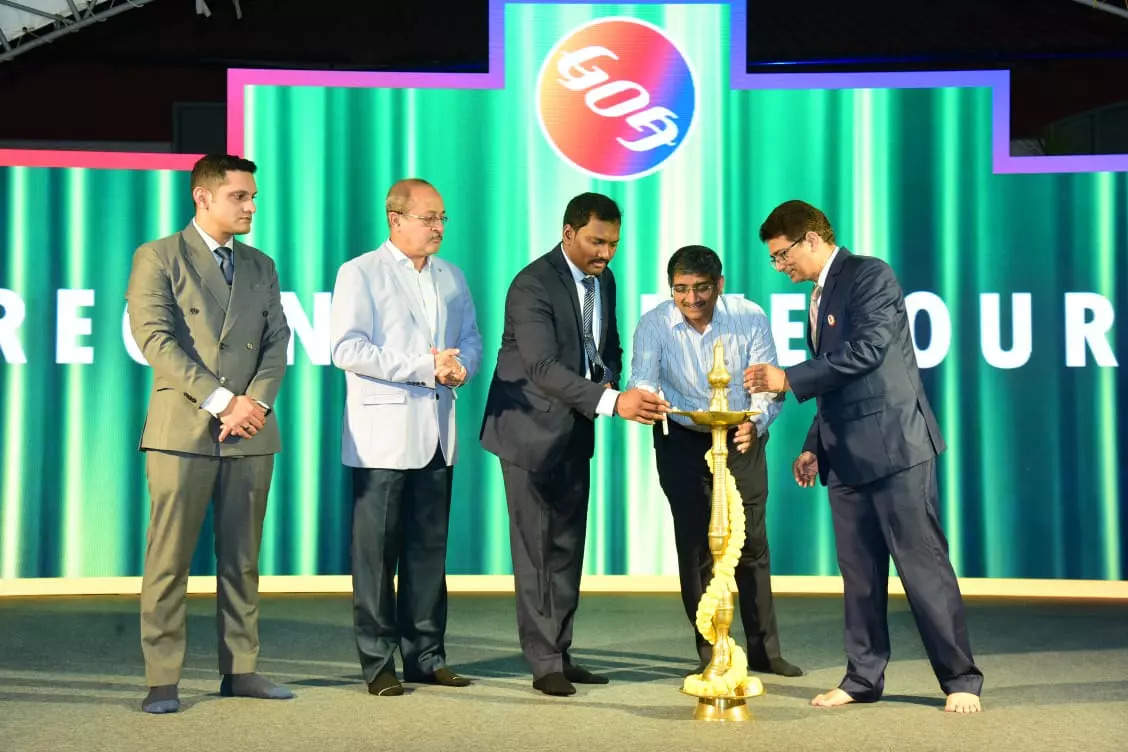
Saudi Tourism Authority hosts mega networking events across India
These power-packed events brought together over 500 travel agents, tour operators, and key stakeholders from the Indian travel trade associations. The STA delegation engaged extensively with participants, showcasing Saudi Arabia's commitment to fostering strategic partnerships and long-term business collaborations in India. In addition to the networking events, STA actively participated in prominent trade shows like OTM in Mumbai and SATTE in Greater Noida.
- By Manas Dwivedi ,
- Updated On Apr 4, 2024 at 09:11 AM IST
All Comments
By commenting, you agree to the Prohibited Content Policy
Find this Comment Offensive?
- Foul Language
- Inciting hatred against a certain community
- Out of Context / Spam
Join the community of 2M+ industry professionals
Subscribe to our newsletter to get latest insights & analysis., download ettravelworld app.
- Get Realtime updates
- Save your favourite articles
- regenerative tourism
- nilesh shah
- goa international travel mart
- Suneel Anchipaka
- GITM in Goa
- travel news
- Goa Travel Mart
The Captable
Social Story
Enterprise Story
The Decrypting Story
Daily Newsletter
By providing your information, you agree to our Terms of Use and our Privacy Policy. We use vendors that may also process your information to help provide our services. This site is protected by reCAPTCHA Enterprise and the Google Privacy Policy and Terms of Service apply.
Founder first
Announcement
Startup Sectors
Women in tech
Entertainment
Art & Culture
Travel & Leisure
Curtain Raiser
Wine and Food
Technology, tourism, and travel: How Goa is poised to become TourismTech hub by 2030
Goa is gearing up to become the world's premier destination for tourismtech startups, thanks to goa tourism accelerator, a programme of fiire (forum for incubation, innovation, research, and entrepreneurship)..
Thursday May 19, 2022 , 17 min Read
[This article is part of Startup Hatch , a series launched in 2013 by YourStory featuring incubators, accelerators, makerspaces, and coworking spaces in the startup ecosystem.
See profiles of initiatives at IIT Bombay , IIM Bangalore, BITS Pilani , NCL , Tata Elxsi, Axilor , NID , IIIT-Bangalore , IIIT-Hyderabad , Vellore Institute of Technology , PSG Coimbatore , Electropreneur Park, Workbench Projects , Makers Asylum , NetApp Excellerator, TechStars, Indigram Labs, WeWork, Z Nation Lab, Sandbox Startups, Brigade REAP, Target India Accelerator, Maersk, Anthill Studio, India Accelerator, UnternehmerTUM, AZO, EXIST, InsurTech Hub Munich, Afthonia Lab, Supreme Incubator, IISC-SID, CoWorks Foundry, and Ashoka Innovators. ]
D S Prashant- CEO, FiiRE
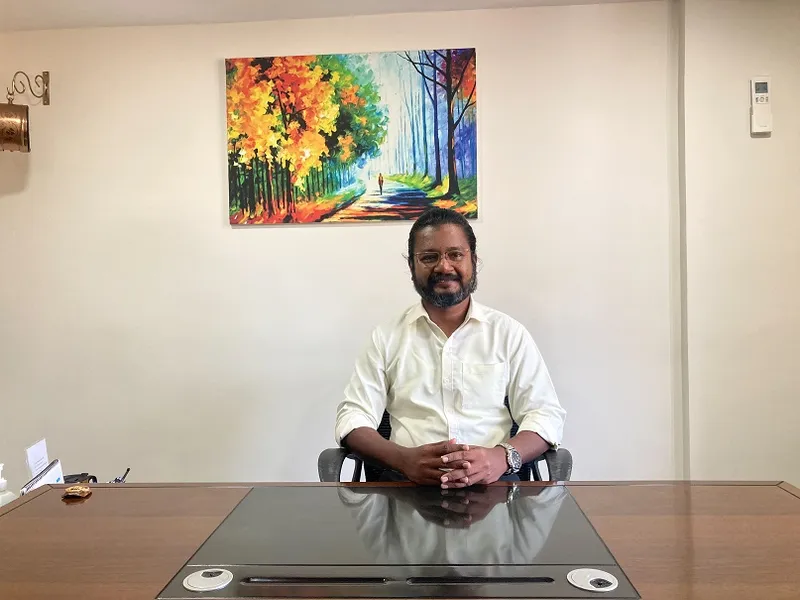
DS Prashant is CEO of FiiRE (Forum for Incubation, Innovation, Research, and Entrepreneurship). He has supported establishment of over 2,000 micro enterprises and hand-held more than 100 startups over the last 23 years in Goa.
Prashant began his career with Glaxo India, and now helps implement startup investment projects of Govt. of India including Startup India Seed Fund, NIDHI PRAYAS, and NIDHI EIR.
Thejus Joseph is COO of FiiRE, and earlier spearheaded Lab32, India’s largest incubation programme at T-Hub in Hyderabad. Lab32’s first batch of 70 startups reportedly generated INR 1+ billion funding, and 2,000+ jobs.
As the Incubation Lead, Thejus has successfully impacted over 500 startups. He founded hardware startup Techjeeva at the age of 21, and was Principal Consultant for a college under Kerala Technical University.
Prashant and Thejus join us in this extended interview on the role of FiiRE, the special Goa Tourism Accelerator programme, opportunities for entrepreneurs, and plans for the future. Edited excerpts below:
Thejus Joseph- COO, FiiRE
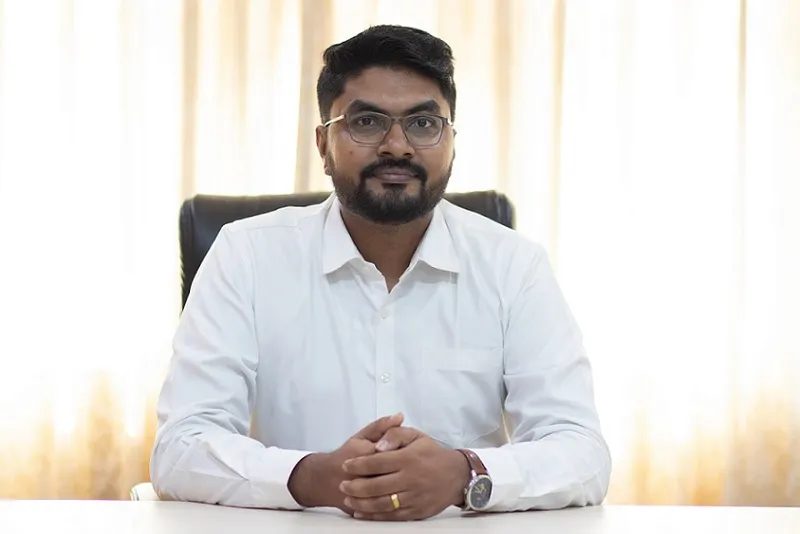
YourStory [YS]: What was the founding vision of your incubator, and how is it supported?
DS Prashant & Thejus Joseph [P&T]: When we started out in 2018, it was our aim to help technology startups get the right mix of education, network and capital support. We hand-held startups through the initial phase of their businesses–from GTM (go to market) strategy and prototype/MVP (minimum viable product) testing to market access and guidance from industry and government.
With the pandemic having brought in fresh dynamics in the economy, we micro-tuned our role as an incubator, and are geared towards our vision of making Goa the world's premier destination for TourismTech startups by 2030.
Based in Goa, one of India’s most-preferred tourism destinations, FiiRE has access to the ecosystem as well as government support.
We wish to nurture startups who have tech-enabled solutions for the tourism sector and take them to a stage where they become investable.
[YS]: Which startups have graduated so far?
[P&T]: Around 20 startups have graduated in a number of sectors such as healthcare (Avital Software Development, Thermodrip, Magellan Life Sciences, Med Interventions & Beyond), gaming (Bidtronix), platforms (Decimi Technologies Fitness Konnect), UAV (Drone Sena), and ed-tech (Eduvannce Intelligos, Foreign Admits, Innovantix Systems, Internship Station Connection).
Other startups are in the categories of agri-tech (Letcetra Agritech, Ulavan Agritech), mobility (Mechgiri Autocare), food (Narla Zest Vida), blockchain (Sparkplus Technology), travel (Synchronicity Platform), IoT (Neerovel), and medical waste management (Goa Health Monitoring Services).
FiiRE Goa Tourism Aceelerator
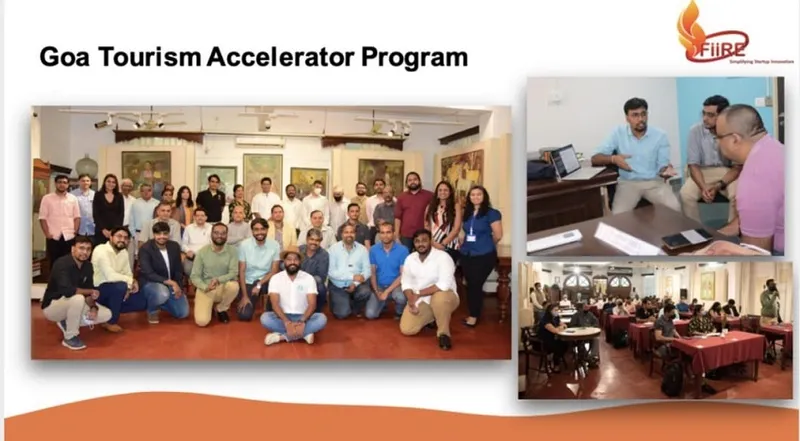
[YS]: Which startups are under incubation?
[P&T]: We have a number of startups currently in the programme, in sectors such as education (WebFills, FunMinds Learning Tech), tourism (Awayddings, Clubr Technologies, Lafabrica Craft), AI (Cognicue Analytics), and marine robotics (Reikse Marine).
Other sectors include platform (WebFills, Custom Elements), HR (Creative HR Solutions), agri/food (Design Lab Biosphere), and waste management (GreenWaves, The Trash Company).
[YS]: Which startups have graduated from the Goa Tourism Accelerator programme?
[P&T]: While we have supported 100 startups and funded 26 of them, our focussed approach towards TourismTech post-pandemic, has led to 14 unique startups that are currently in the acceleration programme.
The first cohort of the Goa Tourism Accelerator programme attracted over 50 applications from seven countries and 25 cities. We have selected 14 startups for the accelerator programme, listed as follows.
Digitour provides immersive audio-visual guided tours of historical heritage monuments through their apps. It meets the needs of the millions of tourists who visit historical monuments every year with the keen interest to understand Indian heritage.
Momingly (Auxbrains Ventures) provides an online marketplace exclusively for home chefs who can own and handle their business independently. Foodies can rate and review the platform for homely food products. The incubation support they offer to homechefs helps them to build a business with a professional touch.
Srishti Lifescience aims to create an ecosystem of hygiene assured, healthy, and enhanced bottled water at affordable prices. They also empower consumers to shift their choices from single-use plastics to zero-waste packaging.
Zodhya can help reduce energy bills of commercial spaces by 30 percent from Day One, and lowering their carbon footprint using AI-based tech.
Tyndis offers tours with local storytellers, community leaders, and activity service providers. They showcase local experiences, heritage, culture, food and adventures in the tours.

Campper helps campsites in digitising their business, standardising operations, and manage demand generation, reservation and revenue. It also helps with landowners in building standardised Campper branded campsites.
Instio offers an integrated digital solution for mobile check-in, guest management, marketing and service quality monitoring for hospitality companies. It helps accommodation providers like hotels and resorts enhance guest experiences and attain operational efficiencies.
Revio is a revenue management company with advanced dynamic pricing technology. With creative software and strategies, they aim to turn around hotels and reposition them to outperform their competitors.
Highway Delite is a digitally-connected highway wayside amenities platform to enable travellers to discover verified pit stops and facilities and transact. Its current coverage is more than 60,000 km pan-India.
hav.life is a fitness app to encourage walking behaviour by counting the steps and rewarding users with gift vouchers. It is available in India and Indonesia and has got more than 500K app downloads.
TravStack provides AI-based SaaS tools to tour operators, travel agents, and other travel businesses. The product suite includes smart itinerary builder, online travel store with CMS, travel planning, and a travel CRM with dashboard. This helps travel professionals improve turnaround time, and boost brand identity and customer engagement.
Offbeat Tracks is an experiential travel company that promotes sustainable and immersive travel across India, exploring local life and culture. It showcases Indian villages as a huge repository of experiences for the immersive millennial traveller, making them the next sought-after tourist destination.
Lokaso Media provides unique photography experiences. It focuses on local talent and curates the best photographers to help travellers freeze special moments of your holiday trip.
10Times is a professional event community and event discovery platform. It enables local commerce focused on inbound tourists and events. It helps with forecasting and planning for transportation, hotels, restaurants, and entertainment.
FiiRE Events
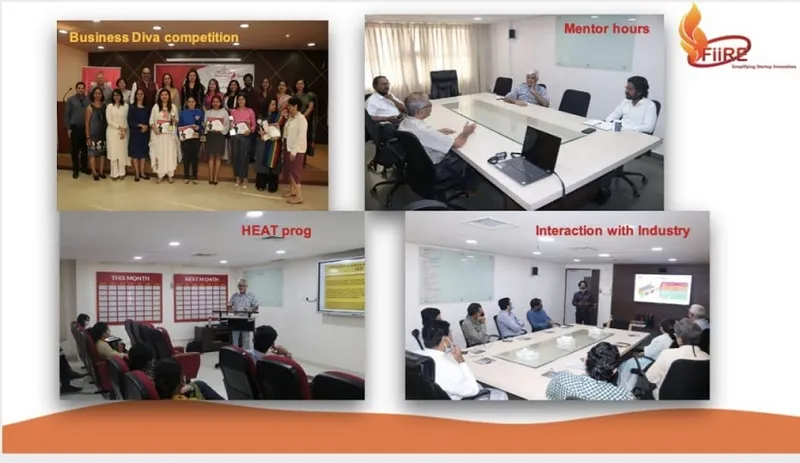
[YS]: What would you say are the top three opportunities for Indian entrepreneurs?
1. The opportunities currently lie in the sectors that will boom over the next decade. TourismTech is gaining attention of investors as well as industry because of the huge challenges it faced during pandemic. There are also innovations in this sector in areas like mobility, customer experiences, and clean tech – these will be areas to explore and build technologies in, over the next decade.
2. While we have the benefit of a vibrant startup ecosystem supported by industry and government, entrepreneurs have taken the lead and tapped into opportunity areas. Industry is focussed towards supporting the booming startup ecosystem. At FiiRE, we support our startups with invaluable collaborations with organisations like Travel & Tourism Association of Goa, Start Up Promotion Cell, and NABARD.
3. Entrepreneurial spirit has grown to an extent where we can now boast of a 100 unicorns! Just as e-commerce and fintech have seen a huge rise, we believe that TourismTech will be a strong sector that will see immense growth over the next five years, given the fact that responsible, sustainable and universally accessible tourism is the global need of the hour.

[YS]: What are the key challenges faced by startups in India, and how can you help bridge the gap?
[P&T]: Startups need to reach out to the right mentors very early on in their journey. Effective mentorship can help them steer away from common pitfalls, test the viability of their tech solutions, guide their business strategy, and set them towards a definite path of growth.
Similarly, the right incubation centre can prove to be invaluable – offering support with networks, entrepreneurial skill building workshops, affordable co-working arrangements, and more.
At FiiRE we support and accelerate technology startups - and especially in TourismTech - an industry that will grow over the next few years. With access to our 2,500 sq-ft space located in Goa – and with mentors that have been especially selected for the expertise they can be provide in this sector – innovators who can provide solutions to challenges faced in the tourism sector worldwide, will stand to gain in the early stages, through being accelerated at FiiRE.
Our partner network of government, academia, investors and other eco-system enablers all add to empower these startups in early stages.
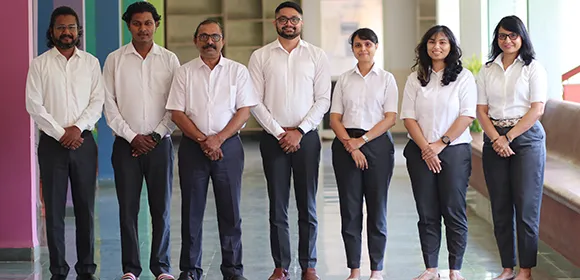
[YS]: What are the unique challenges for social entrepreneurs as compared to tech or profit-led enterprises?
[P&T]: An obvious challenge for social entrepreneurs is access to funding and availability of human recourses that have the emotional bandwidth and high work ethics to perform well in a social enterprise.
For some technology-driven startups who are recognised as engines of growth and job-generation, the attention towards social entrepreneurship may be low.
[YS]: What are the selection criteria for startups in your incubator?
[P&T]: Eligible startups are selected based on scalability, innovation, commitment towards the business idea, and the stage of the business.
Startups in the TourismTech space are identified through the Goa Tourism Accelerator, a 16-week accelerator programme for startup founders who are developing solutions to future-proof the travel, tourism and hospitality industry and thrive amidst the challenges brought about by COVID-19.

[YS]: Who are some of your institutional partners, and what kinds of agreements are in place?
[P&T]: We have tie-ups and partnerships with Government organisations such as Dept. of Science & Technology, Govt. of India, Goa State Innovation Council, Goa Shipyard Ltd., Goa State Schedules Tribes, Finance & Level. Corporation, Ltd, NABARD, and Start Up Promotion Cell Goa.
We also have partnerships with academia (Don Bosco College, Manovikas), ecosystem enablers (CII, Goa Technology Association, Indian Academy of Venture Capital), investors (Sea Fund, Unicorn India Venture), and others We are an approved incubator for disbursement of the Startup India Fund Scheme.
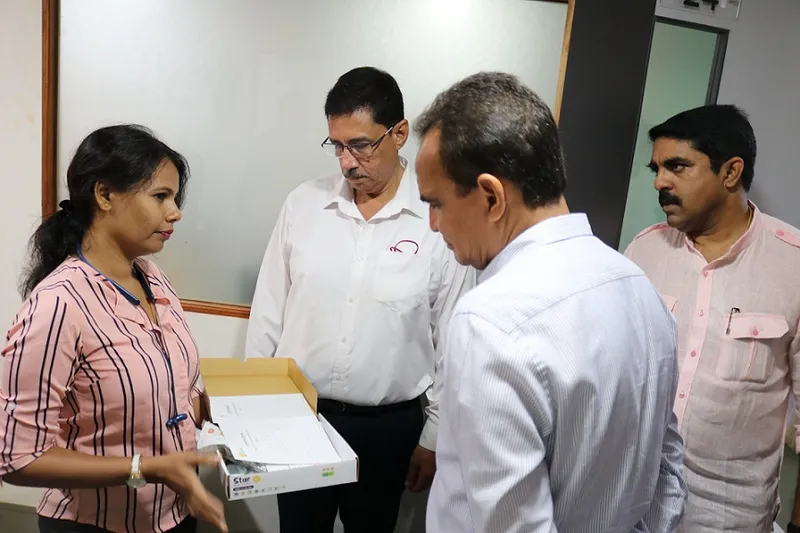
[YS]: What support and services do startups receive in your incubator?
[P&T]: FiiRE as an approved incubator to disburse the Startup India Seed Fund Scheme, playing the role of providing financial assistance to startups for proof of concept, prototype development, product trials, market entry, and commercialisation.
FiiRE supports entrepreneurs under the NIDHI Entrepreneurs-in-Residence (EIR) Programme (set up to minimise the risk involved in initiating a startup, and to partially set off their opportunity costs of high paying jobs). We provide guidance from experienced and successful entrepreneurs on business concept, strategy or venture and insight into specific industries or markets. Currently, eight startups are being supported under NIDHI EIR and 10 under NIDHI PRAYAS.
Our co-working space (MakerSpace) is freely available for startups who are incubated under the above two schemes.
Under NIDHI (National Initiative for Developing and Harnessing Innovations) PRAYAS (Promoting and Accelerating Young and Aspiring technology entrepreneurs), FiiRE supports innovators in trying their ideas without fear of failure, allowing them to reach a stage where they have a ready product and are willing to approach incubators for commercialisation. The maximum grant support extent to each innovator or incubatee is Rs 10 lakh.

[YS]: What percentage of equity do you take in your startups?
[P&T]: No equity or royalty is charged to a startup. We have a mission to support tourism tech startups as we have access to stakeholders needed for the tourism startup ecosystem.
We believe in fulfilling our role as an ecosystem enabler for the tourism sector, by garnering support from government, market, and placing startups in a position where they can be funded in the future.
Dr Anita Gupta, DST at FiiRE

[YS]: What kinds of IP are being created by your startups?
[P&T]: The flagship program of FiiRE, Goa Tourism Accelerator is a 16-week accelerator programme. It is designed for early and late-stage startups to harness the global customer perspective from Goa and build a truly global business.
The first cohort attracted more than 50 applications from which we selected 14 startups. We also have a virtual programme which provides opportunities to network with local and global experts and learn with fellow founders from all around the world.
Four of the startups have filed for patents as well: Rekise Marine (autonomus battery operated surveillance vehicle), Brave Technologies (lifesaving temperature-regulating machine), LaFabrica Craft (paper bag that can carry up to 10 kilos), Team Yaguar (drag reduction for increased performance and multi-contour duct, designed for increasing velocity by 2.5 times).

[YS]: How would you differentiate your incubator from the other incubators in the field?
[P&T]: While we are a technology business incubator with special interest in product development and manufacturing startups, post the pandemic, we realised that one of the worst affected industries was the travel and tourism industry.
It appears to have taken the hardest hit globally, impacting various associated sectors. According to the World Travel and Tourism Council (WTCC), the COVID-19 pandemic is likely to cost the tourism industry almost $22 billion and a loss of nearly 50 million jobs worldwide.
Goa’s tourism alone suffered a loss of Rs 2,000-7,200 crore in 2020. We have now made it our vision to help rebuild this industry by accelerating startups with innovative TourismTech solutions. Since we are based in Goa, the access to the tourism ecosystem helps provide startups with a ready network of industry experts as well as avenues to test the viability of their solutions.
TourismTech is yet a nascent concept, especially in India, with few realising the scope and impact that innovation can bring about to this industry.
We wish to bring about tremendous positive impact by supporting business solutions that will benefit tourism – from operational efficiency to advanced decision making and new payment solutions.
FiiRE CoWorking space
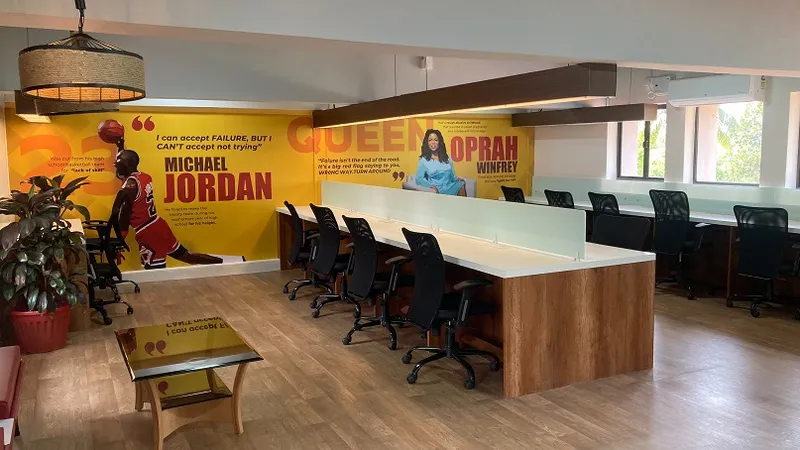
[YS]: What are some challenges you face, and how do you plan to overcome them?
[P&T]: One of the first affected sectors globally, during pandemic was tourism. And being a state with tourism as the major revenue source, Goa was severely impacted. This is why we decided to support and accelerate TourismTech startups.
Any solutions that improve the experience in a tourism ecosystem can fall in the TourismTech category–travel and hospitality are the obvious choices, but so are mobility, clean tech, waste management, and smart city.
We are rebuilding the incubator as well as the state with a strong emphasis on TourismTech. At the same time we are encouraging start up innovators from across the country to set up their startups here at FiiRE, and take advantage of all the support we provide.
They can also choose to be part of our virtual program, where we give them access to local and global partner networks.

[YS]: What would you define as success for your incubator?
[P&T]: We have supported over 100 startups, funded 26, and engaged over 2,500 entrepreneurs through events and workshops and investor meets. Collaborating with Govt. and industry to scout for innovative solutions through startups to solve tourism challenges is the way ahead for us.
Success for us will be about moving towards our vision of making Goa the world's premier destination for TourismTech startups by 2030.
FiiRE Cafeteria
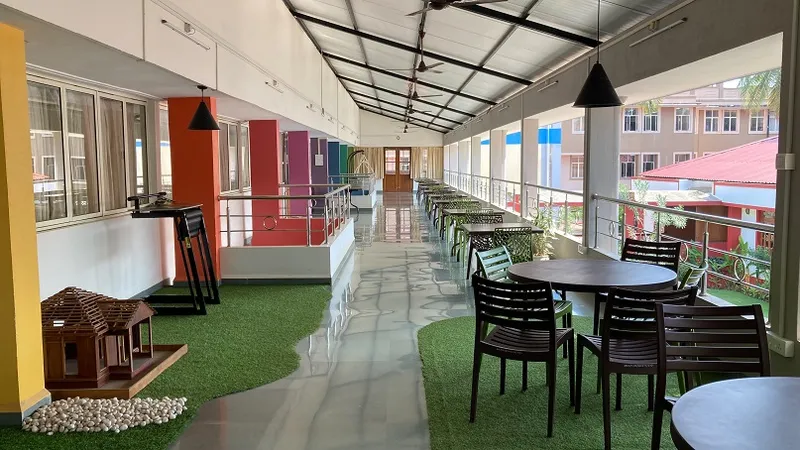
[YS]: What are some notable startups who have graduated from your incubator, and what are their achievements?
[P&T]: In February 2022, GreenPod Labs, a Chennai-based agri-biotech company received Rs 4.05 crore investment from IAN with Rockstart as a co-investor. FiiRE had helped them with the Startup India seed fund grant and took them through the prototype development stage.
FiiRE also helped Runo, a new-age call-management CRM, raise $5 lakh in a pre-Series A round led by Unicorn India Ventures.

[YS]: How do you compare and contrast India’s incubators with that of other countries like US and China?
[P&T]: Over 60 percent of incubators in China are private enterprises with business-oriented operations. The US has over 2,000 accelerators and incubators, some independently run, while others are backed by governments, investors or corporations.
Even though India’s startup ecosystem is still in its infancy, it is already the third-largest in the world. With over 61,400 startups recognised by the Department for Promotion of Industry and Internal Trade (DPIIT), the 300+ incubators in India can play a large role in boosting the startup ecosystem through the power of their collaborations, networks, and access to other startup enablers.
Incubators in India are predominantly housed within academic institutions like FiiRE – which is housed within Don Bosco College of Engineering. Almost half the incubators are affiliated with the Department of Science and Technology, Govt of India.
Considering the fact that startups are going to play a huge role in the development of all three countries in the coming years, India would benefit from incubators that support startups providing solutions to global challenges. These include tourism revival, sustainable living and working, wide-spread and affordable healthcare, e-learning solutions, or fintech solutions.
FiiRE Award - Business Goa Awards 2022
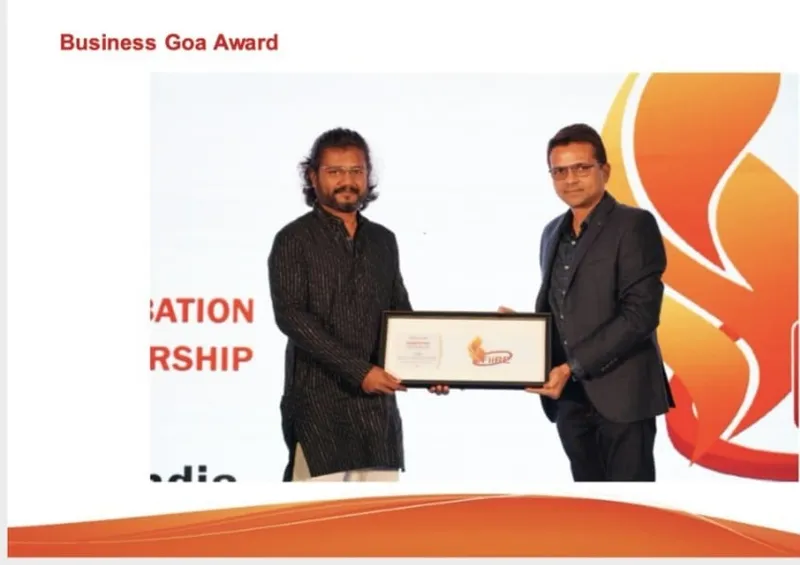
[YS]: What are your plans for the coming 3-5 years with respect to new startups?
[P&T]: Over the next 3-5 years our focus will be on incubating, and accelerating TourismTech startups who are reshaping tourism for travellers, suppliers, and the environment. We believe that incorporating technology in the tourism value chain to enhance quality of experience for tourists is an essential part of the revival strategy for this sector
With a vision to make Goa the world's premier destination for TourismTech startups by 2030, we have launched Goa Tourism Tech Accelerator Programme to identify innovations in this sector and then provide the necessary support.
With 14 unique startups already being accelerated under this programme, we will be planning to launch the second cohort to identify more such tech innovations in the tourism industry.

[YS]: What are your recommendations for Indian policymakers to make business easier for incubators, investors, researchers and startups in India?
[P&T]: The World Bank Ease of Doing Business Index ranks India 63rd of 190 countries in 2021. India being the third-largest startup ecosystem in the world after the US and China, (as per the Economic Survey 2021-22), policy makers may need to bridge the gap.
We believe that as an incubator empowered to disburse the Startup India Fund and implement various startup schemes, the Government plays its role as an enabler, propelling growth through incubators like us.
The game-changers in an economy such as Goa, where tourism has been the main stay, is innovative ideas that address larger global challenges. It is in our interest to reach out to and identify technology startups that will change the face of tourism. This can lead to sustainable solutions, mobility, lifestyle or experiential products that will interest future travellers, frictionless payment solutions, personalised travel experiences, and more.
FiiRE Women’s Day
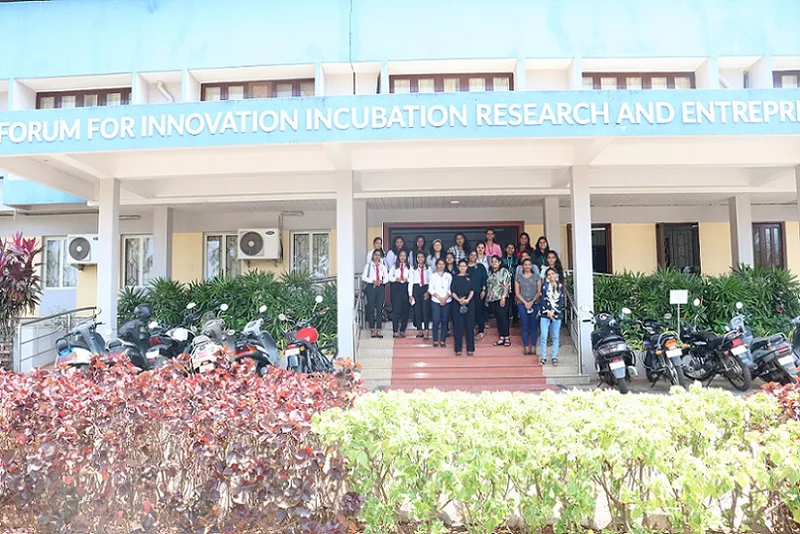
[YS]: What are your tips or words of inspiration for the startups and entrepreneurs in our audience?
[P&T]: Tech startups need to look at the global landscape – identify the sectors that will require their solutions, pivot their offerings to serve not only a specific audience, but the larger global community as well.
They should always keep at the forefront of their business plan a sustainable way of operating and growing their businesses.
Edited by Affirunisa Kankudti
- startup hatch
- goa tourism accelerator
- Startup Ecosystem
- DS Prashant
- Thejus Joseph
MOST VIEWED STORIES

Flipkart hosts seller conclaves ahead of The Big Billion Days sale

Paytm to revamp senior leadership, with key hires upcoming: Vijay Shekhar Sharma

Online payment startups push for offline and overseas expansion as competition heats up

Taiwan Teacher Makes Rs.2 Crore Teaching Math on an Adult Site

- Advertise With Us
- Write For Travel Mail
- Weekly Newsletter
- Disclaimer & Terms of Service
- Privacy Policy

Unlocking Goa’s Tourism Potential: GITM 2024 Paves the Way for a Renaissance
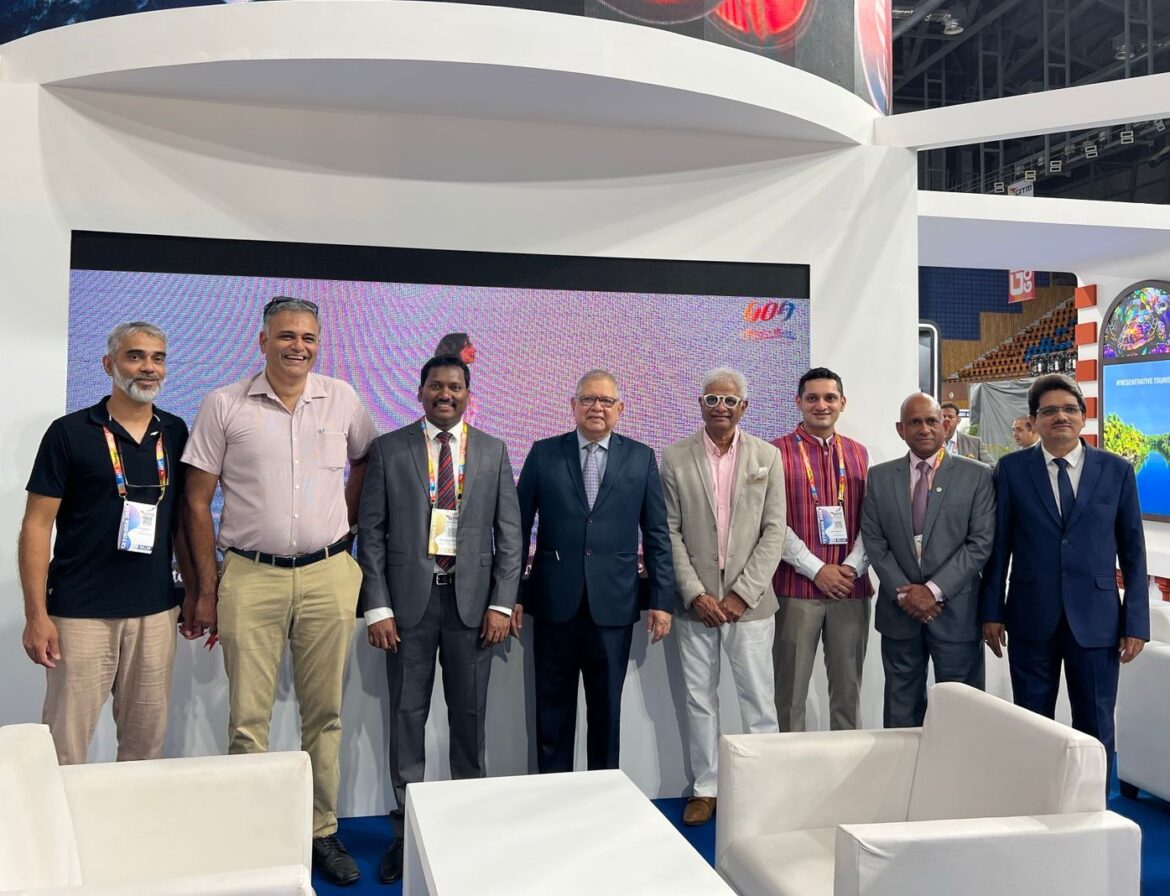
Connecting Tourism Globally at GITM 2024
The curtains rose on the eagerly awaited Goa International Travel Mart (GITM) 2024, ushering in a new era of possibilities and opportunities for the global tourism industry. Set against the vibrant backdrop of Dr. Shyama Prasad Mukherjee Stadium, the event commenced with palpable excitement, drawing together a diverse gathering of industry leaders, government officials, and passionate tourism enthusiasts from around the world.
Embracing Regenerative Tourism: A Paradigm Shift
One of the defining themes of GITM 2024 was the spotlight on regenerative tourism, marking a significant departure from conventional tourism practices towards sustainable and eco-conscious approaches. This paradigm shift underscores a collective commitment to not only preserving but actively restoring the natural beauty and cultural heritage of destinations like Goa. With a focus on fostering symbiotic relationships between tourists and local communities, regenerative tourism strives to create lasting positive impacts that transcend economic gains.
MICE Tourism: Goa’s Gateway to the Global Stage
Amidst the picturesque landscapes and azure coastlines, Goa has emerged as a premier destination for Meetings, Incentives, Conferences, and Exhibitions (MICE) tourism. Boasting world-class infrastructure and state-of-the-art amenities, the region offers an unparalleled setting for hosting corporate events and international conferences. GITM 2024 showcased Goa’s prowess in the MICE segment, highlighting its potential to attract a diverse range of business travellers seeking both productivity and leisure in equal measure.
A Wedding Wonderland: Goa’s Allure as a Romantic Destination
Renowned for its idyllic settings and enchanting ambience, Goa continues to captivate couples seeking the perfect backdrop for their nuptials. With a fusion of rich cultural heritage, warm hospitality, and impeccable services, the region has cemented its reputation as a premier wedding destination on the global stage. GITM 2024 celebrated Goa’s romantic allure, showcasing a myriad of enchanting venues and bespoke experiences tailored to create unforgettable memories for couples from across the globe.
Inauguration: A Symbol of Commitment to Excellence
The inaugural ceremony of GITM 2024 marked a symbolic milestone in Goa’s journey towards tourism excellence. Led by esteemed dignitaries including Mr. Suneel Anchipaka, IAS, Director Tourism & Managing Director GTDC , the ceremony underscored the state’s unwavering commitment to showcasing its rich cultural heritage and diverse tourism offerings to the world. The inauguration of the Goa Tourism stall served as a beacon of Goa’s hospitality and warmth, inviting visitors to embark on a journey of discovery and exploration.
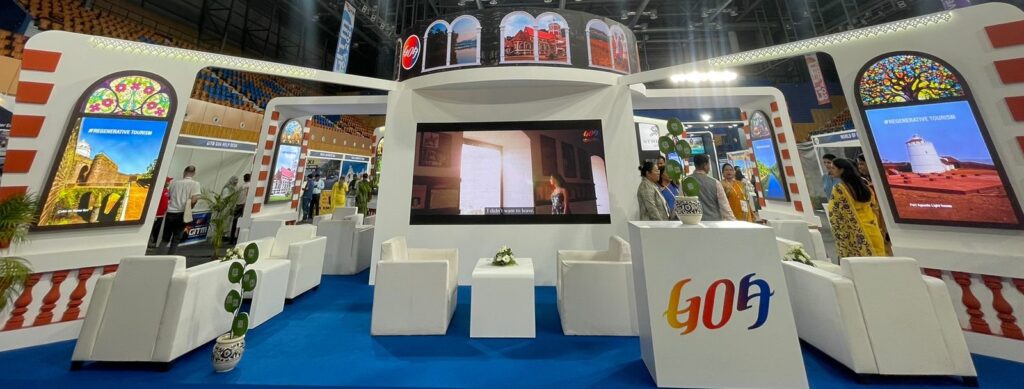
Knowledge-Sharing Sessions: Illuminating Pathways for Progress
Throughout GITM 2024, attendees were treated to a series of enlightening knowledge-sharing sessions, delving into the nuances of regenerative tourism and emerging trends shaping the industry landscape. Led by experts in the field, these sessions provided invaluable insights into innovative strategies for driving Goa’s tourism sector forward in a sustainable and socially responsible manner. From exploring the role of technology in enhancing visitor experiences to addressing the challenges of over-tourism, the discussions sparked meaningful dialogue and laid the groundwork for future collaborations.
Keynote Address: Inspiring a Vision for Sustainable Tourism
A highlight of GITM 2024 was the keynote address delivered by Mr. Suneel Anchipaka, IAS, Director Tourism & Managing Director GTDC , wherein he articulated Goa’s vision for sustainable tourism development. Emphasizing the importance of responsible travel practices and environmental stewardship, Mr. Anchipaka outlined Goa’s holistic approach to regenerative tourism, one that seeks to preserve and protect the state’s natural and cultural heritage for generations to come. His impassioned plea for collective action resonated with attendees, igniting a sense of urgency and purpose in the pursuit of a more sustainable tourism future.
Global Participation: Uniting Stakeholders for Change
GITM 2024 witnessed a robust turnout of international buyers and domestic stakeholders, reaffirming Goa’s status as a global tourism hub. With delegates hailing from diverse corners of the globe including India, Germany, United Arab Emirates, Italy, and beyond, the event served as a melting pot of ideas and perspectives. As stakeholders converged to exchange insights and forge partnerships, Goa emerged as a trailblazer in regenerative tourism, leading the charge towards a more sustainable and inclusive tourism industry on a global scale.
Looking Ahead: Shaping the Future of Tourism
As the curtains draw to a close on the first day of GITM 2024, anticipation mounts for the days ahead, brimming with enriching sessions, productive engagements, and exciting opportunities to chart the course for Goa’s tourism renaissance. With a lineup of esteemed panellists and thought leaders set to grace the stage, the second day promises to build upon the momentum of the inaugural day, paving the way for a brighter, more sustainable future for tourism in Goa and beyond.
Read more at TravelMail | Follow us on Facebook | Twitter | and Instagram for on-the-go news
Love Reading at Travel Mail? Now get it in your INBOX!
Join our mailing list to receive the latest news and updates from Travel Mail Weekly!
You have Successfully Subscribed!
Travel Mail
Travel Mail is the brand name of India’s leading International Magazine TRAVEL MAIL published from New Delhi. Travel Mail's Print Edition & Online News Portal will give you best, latest and exclusive coverage of International and Domestic Tourism, Tourist Destination, Hospitality, Aviation, Lifestyle, Auto, Fashion, Food & Beverages, Fair & Festival, Art, Culture etc.
Expanding Connectivity: Malaysia Airlines and IndiGo Sign MoU
Luxuriate in the splendor of avongrove tea gardens by atmosphere core in darjeeling, west bengal, related articles, malaysia airlines launches special fares to australia in..., red sea global’s sustainability report highlights progress toward..., crafting beautiful journeys: insights from brightsun travel on..., spectacular saudi: campaign invites indian travellers to discover the..., rajasthan domestic travel mart 2024: elevating event tourism..., etihad launches a380 in mumbai for 20th anniversary..., jazeera airways reports 37.3% profit growth in 2q..., saudi tourism authority hosts qahwa experience in bengaluru..., hospitality sector sees 4.8% revpar growth in q2..., vietjet expands fleet with 10 new a321neo aircraft....
This website uses cookies to improve your experience. We'll assume you're ok with this, but you can opt-out if you wish. Accept Read More
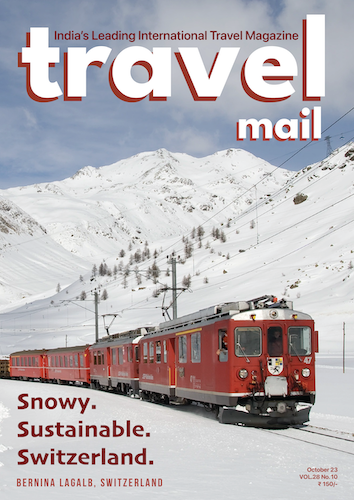
Tourism Goa focussing on regenerative tourism and much more: Rohan Khanute
Goa tourism minister rohan khaunte has stated that the state is set to enhance its tourism offerings with innovative attractions like a 3d statue of the lord parashuram, other iconic monuments and a world class oceanarium..

Ride the rapids and feel the rush! #Riverrafting in #Goa offers an exhilarating adventure through its scenic rivers. Details: https://t.co/CJNXSHNfJY @SuneelAnchipaka @sanjeevahuja007 @RohanKhaunte — Goa Tourism (@TourismGoa) August 30, 2024

Goa Invites Public Suggestions for New Tourism Bill – India Report

Bulbul Dhawan , Skift
July 9th, 2024 at 11:00 PM EDT
Goa is working to position itself as more than just a tourism destination known for its beaches and nightlife. As it seeks to welcome more visitors, the state is taking measures to ensure that the negative impacts of tourism are mitigated - both on the environment and its people.
Bulbul Dhawan
- Why has the on-time performance of Indian airlines declined recently?
- What is the significance of Galeries Lafayette adopting India's UPI payment system?
- What factors are contributing to the growth of outbound travel from India?
Select a question above or ask something else
- Goa seeks public input on its draft Tourism Promotion and Management Bill, 2024, focusing on tourism regulation and sustainability.
- India is becoming a major source of outbound tourism, with significant increases in international travel and spending.
- Galeries Lafayette integrates India's UPI payment system to accommodate growing Indian tourist numbers.
The coastal state of Goa has invited public feedback on its draft Tourism Promotion and Management Bill, 2024, which aims to address illegal activities, job creation, and economic impact in the tourism sector. The bill includes the development of tourism clusters and sustainable tourism practices. Meanwhile, India is emerging as a significant source of outbound tourism, with a notable increase in international travel and spending. However, Indian airlines have experienced a decline in on-time performance. Additionally, Galeries Lafayette has adopted India's UPI payment system to cater to the increasing number of Indian tourists.
The Skift India Newsletter is your go-to platform for all news related to travel, tourism, airlines, and hospitality in India.
The coastal state of Goa has asked for public views, objections, and suggestions on the draft of the Goa Tourism Promotion and Management Bill, 2024. The bill aims to look at various aspects of tourism in the state, including illegal activities, job creation, and impact on the state’s economy.
According to Goa tourism minister Rohan Khaunte, the bill has already taken into consideration inputs from the industry stakeholders.
Tourism Clusters: As part of its tourism development, the state is developing tourism clusters in the state. It currently does not have any.
In the draft bill read by Skift, Goa tourism ministry said that the number of tourists visiting the state significantly outnumber the residents. Accordingly, it is important “to identify and demarcate areas for targeted tourism development and to ensure the safety and well-being of tourists through appropriate regulation and control over activities, persons, and entities.”
A Sustainability Fee? Recent media reports stated that the state was planning to introduce a 2% ‘tourism development and sustainability’ fee. The state’s tourism minister has clarified that the claim of a sustainability fee is “baseless.” “It is a tax of up to 2%, and it will be limited only to the relevant clusters once they are created,” Khaunte said.
However, propagation of sustainable tourism practices is a key component of the state’s draft bill. The state is aiming to incentivize adoption of sustainable practices and mitigate the negative impact of tourism on the environment.
The draft bill contains a separate chapter to focus on measures for sustainable tourism, including the constitution of a board responsible for developing, managing, and enabling the state as a sustainable tourist destination, awareness and capacity building, and carrying capacity assessment.
India Emerging as Future Growth Engine for Global Tourism: OECD
“Outbound travel from India is emerging as a future growth engine for global tourism,” said a recent report on tourism trends and policies by the Organisation for Economic Co-operation and Development (OECD). The report said that the rapid expansion of the middle class and scaling up of air connectivity within the country are key factors in this.
Data from the Directorate General of Civil Aviation shows that within the first three months of 2024, nearly 9.4 million passengers from India traveled abroad. This marked a 15% increase from the 8.1 million passengers that traveled internationally last year during the same period.
A recent report by consulting firm McKinsey and Company said that India is becoming a fast-growing source of outbound tourism, stating that the country is developing “fast-growing pools of first-time tourists.” Indians have also reached a new peak in overseas spending , with travel accounting for $17 billion out of the $31.7 billion that Indians spent overseas in the 2023-24 financial year.
On-Time Performance of Indian Carriers Down Significantly
The on-time performance of Indian airlines has seen a significant decline across the board between May 2023 and May 2024, according to an analysis of data shared by the Directorate General of Civil Aviation (DGCA). Budget airline Akasa Air, which was the most punctual airline in May this year as well as last year, saw its on-time performance at four metro airports – Bangalore, Delhi, Hyderabad, and Mumbai – decline from 92.6% last year to 89.2%.
IndiGo, which was the flagbearer of on-time performance for several years, slid from the second position last year to the fourth place in May 2024, declining from 90.3% on-time performance to 76.1%. Full-service sister carriers Vistara and Air India also witnessed decline in on-time performance of more than 10%.
Low-cost airline SpiceJet was the only airline out of seven domestic carriers to witness improvement in this metric, increasing from 60.9% in May 2023 to 64.2% this year.
Galeries Lafayette Haussmann Adopts India’s UPI Payment System
French department store brand Galeries Lafayette has announced the integration of India’s Unified Payments Interface (UPI) system at its flagship Haussmann store.
Vincent Sénéquat, Director of Galeries Lafayette Paris Hausmann said that as the number of visitors from India increase, the integration of UPI would allow a convenient payment option for Indian customers. “With the opening of our first Indian store in Mumbai in 2025, followed by New Delhi, this initiative becomes even more significant,” Sénéquat added.
UPI is a technology implemented in India in 2016 and it enables instant and interbank money transfers via mobile applications. Users can link multiple bank accounts to a single app, with each bank account getting a unique virtual identifier to make the payments.
Earlier this year, UPI payments were also enabled for purchasing tickets to the Eiffel Tower, as part of UPI developer National Payments Corporation of India’s partnership with French fintech player Lyra Network.
Stotrak Hotels Opens Sangam by Stotrak in Mussoorie
Experiential hotel chain Stotrak Hotels has announced the opening of Sangam by Stotrak in Uttarakhand’s Mussoorie. The 10-key hotel is the chain’s fourth property in the hill station, taking its inventory in Mussoorie to more than 85 rooms. The chain now has 12 hotels in its portfolio.
Manish Goyal, founder of Stotrak Hotels, told Skift, “Stotrak Hotels has been very consistent when it comes to expansion, as the founding team is a firm believer of stability. The vision has always been to keep a balance between experiential stays together with exploring new and niche destinations.”
The company’s initial plans were to have a strong footprint in the northern state of Uttarakhand. It already has eight properties with over 150 keys in the state. The chain also has luxury portfolio in Rajasthan consisting of more than 120 rooms. “The group now is foraying into Himachal Pradesh with a 4-star resort in the upcoming hill station of Nahan,” Goyal shared.
Skift India Report
India is booming. Discover the subcontinent’s most important travel news here every Tuesday-Thursday.
Have a confidential tip for Skift? Get in touch
Tags: climate change , digital , flight delays , global payments , goa , india , india outbound , indian airlines , mobile payments , overtourism , Payment Technology , payments , skift india report , sustainable tourism , travel payments
Photo credit: As part of its tourism development, the state is developing tourism clusters in the state. christie2025 / Pixabay
- Work & Careers
- Life & Arts

Rise of the Indian tourist: travel industry pivots to next big market
Keep abreast of significant corporate, financial and political developments around the world. Stay informed and spot emerging risks and opportunities with independent global reporting, expert commentary and analysis you can trust.
Try unlimited access Only $1 for 4 weeks
- Then $75 per month
- New customers only
- Cancel anytime during your trial
Keep reading for $1
Explore our subscriptions
Find the plan that suits you best.
- Print + digital
Professional
Premium access for businesses and educational institutions.
- Get Started
Check if your university or organisation offers FT membership to read for free.

India’s first state to launch Regenerative Tourism
Sustainable tourism and Regenerative tourism share the overarching goal of minimizing the negative impacts of tourism on the environment, local communities, and cultures.
However, they differ in their specific approaches and ultimate objectives.
Key distinctions between
S ustainable tourism & Regenerative tourism
Philosophy and Approach
Sustainable Tourism
Regenerative Tourism
This approach seeks to maintain the status quo by balancing economic, social, and environmental considerations. It aims to meet the needs of the present without compromising the ability of future generations to meet their own needs. Sustainable tourism focuses on minimizing negative impacts and often involves conservation, responsible resource use, and community engagement.
In contrast, regenerative tourism goes beyond sustainability by actively seeking to improve and restore ecosystems, communities, and cultures. The regenerative approach aims to leave a positive impact, contributing to the well-being of destinations and fostering resilience. It emphasizes the restoration and revitalization of natural and cultural assets.
Local Community Engagement
Sustainable tourism typically involves community engagement and benefit-sharing, ensuring that local communities benefit economically and socially from tourism. However, the focus may be on maintaining a balance rather than actively contributing to community empowerment and regeneration.
Regenerative tourism places a strong emphasis on community empowerment and participation. It seeks to involve local communities in decision-making processes, encourages entrepreneurship, and aims to leave a lasting positive impact on the social fabric of destinations.
Environmental Conservation
Sustainable tourism aims to minimize the environmental impact of travel and tourism activities. This may include practices such as responsible waste management, energy conservation, and biodiversity protection.
Regenerative tourism not only minimizes negative impacts but actively works towards restoring and enhancing ecosystems. This approach may involve reforestation projects, habitat restoration, and other initiatives aimed at improving the overall health of natural environments.
Cultural Preservation
Sustainable tourism recognizes the importance of preserving local cultures and traditions. Efforts are made to ensure that tourism activities do not lead to cultural erosion or exploitation.
Regenerative tourism takes cultural preservation a step further by actively contributing to the revitalization of local cultures. This may involve supporting traditional arts and crafts, promoting cultural exchanges, and actively engaging tourists in meaningful interactions with local communities.
Long-Term Impact
Sustainable tourism seeks to maintain a balance over the long term, ensuring that the impacts of tourism do not compromise the well-being of future generations.
Regenerative tourism goes beyond maintaining a balance; it strives to leave destinations better off than before. The ultimate goal is to contribute positively to the regeneration of ecosystems, communities, and cultures, creating a lasting and positive legacy.
Tourism has long been a double-edged sword, contributing to economic development while often causing environmental degradation and cultural erosion. In recent years, a paradigm shift towards more sustainable practices has emerged, and one such approach gaining prominence is regenerative tourism. Unlike conventional tourism, which may exploit natural resources and local cultures, regenerative tourism seeks to restore and revitalize destinations, leaving them better off than before.
Principles of Regenerative Tourism
Community Empowerment
Regenerative tourism prioritizes local communities by involving them in decision-making processes and ensuring they benefit economically and socially from tourism. This approach fosters a sense of ownership among residents, leading to more responsible tourism practices.
*Not valid for business class
Preservation of Natural Resources
Instead of depleting natural resources, regenerative tourism aims to enhance and protect them. Sustainable practices, such as responsible waste management, energy conservation, and biodiversity preservation, help minimize the environmental footprint of tourism activities.
Cultural Respect and Preservation
Regenerative tourism values and respects local cultures, seeking to preserve traditions and heritage. Engaging with communities in a meaningful way, promoting cultural exchanges, and supporting local artisans are integral to this approach.
Holistic Planning and Development
Regenerative tourism involves comprehensive planning that considers the long-term impact of tourism on all aspects of a destination—environmental, social, and economic. Sustainable infrastructure development and land-use planning are crucial components.

of Regenerative Tourism

Economic Resilience
By involving local communities in tourism initiatives, regenerative tourism contributes to economic resilience. Income generated from tourism is more evenly distributed, creating a more stable and sustainable economic foundation for communities.

Environmental Conservation
Through sustainable practices and a commitment to conservation, regenerative tourism helps protect ecosystems and biodiversity. This ensures that the natural attractions that draw tourists remain intact for future generations.

Cultural Enrichment
Regenerative tourism supports cultural preservation, fostering pride and a sense of identity among local communities. This not only benefits residents but also provides a richer and more authentic experience for tourists.

Social Inclusivity
This approach encourages inclusive and responsible tourism, making destinations accessible to a broader range of travellers. By breaking down barriers, regenerative tourism promotes diversity and inclusivity within the tourism industry.
Challenges and Future Prospects
While regenerative tourism presents a promising path towards sustainable travel, challenges such as resistance to change, lack of awareness, and the need for coordinated efforts among stakeholders remain. Governments, businesses, and tourists alike must actively participate in fostering a regenerative approach to tourism. The future of travel lies in our ability to prioritize regenerative practices, creating a harmonious balance between economic development and environmental and cultural preservation.
Five priorities of the Goa Tourism Roadmap that are woven into regenerative tourism.
Green tourism
Greening the tourism sector for a sustainable, responsible and resilient tourism sector
Digitalization
Harnessing the power of digitalization to promote competitiveness, inclusion and sustainability in the tourism sector
Empowering youth with skills for jobs and entrepreneurship in the tourism sector
Tourism MSMEs
Nurturing tourism MSMEs, startups and the private sector to unleash innovation and dynamism in the tourism sector
Destination management
Rethinking the strategic management of destinations towards a holistic approach that delivers on the SDGs.

To help framing the relationship between tourism and the Sustainable Development Goals (SDGs) in the development of the current Roadmap, a survey among G20 members and guest countries was conducted. The answers helped to identify the SDGs which tourism was considered to impact the most:

SDG 8: Decent work and economic growth;
SDG 9: Industry, innovation, and infrastructure;
SDG 11: Sustainable cities and communities;
SDG 12: Responsible consumption and production;
SDG 17: Partnerships for the goals.
A set of ten cross-cutting key enablers have been identified by the Goa Tourism Roadmap based on a systems level analysis of recommendations from reports, surveys, case studies and best practices shared by practitioners across the tourism sector.
1. Working towards climate action and environmental protection and related international cooperation;
2. Equitable economic models to promote inclusive tourism and empower vulnerable groups, such as youth, women, Indigenous Peoples and persons with disabilities;
3. Sustained public-private-community partnerships, including employers’ and workers’ organizations, to develop more innovative and sustainable tourism initiatives;
4. Visitors as key stakeholders to help transform the sector towards sustainability;
5. Holistic destination management to help the sector adapt to today’s challenges;
6. Upskilling, reskilling and new skilling tourism actors, focussing on vulnerable groups (such as youth, women, Indigenous Peoples and persons with disabilities), as well as MSMEs, to reduce inequalities, foster inclusion and social justice;
7. Strengthening measurement, monitoring, and reporting to better understand and manage the impact and interdependences of tourism on its three dimensions – economic, social and environmental;
8. Consistent knowledge sharing between traditional and non-traditional actors to bridge knowledge gaps and accelerate progress within the sector;
9. Innovative approaches to meet the SDGs; and
10. Long-term forward planning to foster tourism resilience.

Spiritual tourism intersects with regenerative tourism and substantially contributes to it. Spiritual tourism can play a significant role in regenerative tourism by promoting a holistic approach to travel that focuses on the well-being of individuals, communities, and the environment.
Cultural Exchange and Understanding
Spiritual tourism often involves visiting sacred sites, participating in rituals, and engaging with local communities. This fosters cultural exchange, understanding, and respect between travellers and host communities, promoting a sense of unity and shared humanity.

Community Empowerment
Many spiritual tourism destinations are in rural or less economically developed areas. By attracting visitors, these areas can experience economic benefits. Responsible spiritual tourism initiatives prioritize community engagement and empowerment, ensuring that local residents have an active role in tourism activities and can benefit from the economic opportunities it brings.

Spiritual tourism often involves visits to natural and serene environments. Sustainable and regenerative tourism practices associated with spiritual travel can help preserve these ecosystems. Conservation efforts and responsible tourism practices are integral to maintaining the spiritual and natural integrity of these destinations.

Well-being and Mindfulness
Spiritual tourism often emphasizes personal well-being, mindfulness, and self-discovery. Travelers seeking spiritual experiences are more likely to appreciate and respect the environment they are in. This mindfulness can translate into responsible tourism practices, such as reducing waste, conserving resources, and supporting sustainable initiatives.

Local Traditions and Crafts
Spiritual tourism encourages travellers to engage with local traditions, arts, and crafts. This helps in preserving and promoting the unique cultural heritage of the destination. Travelers may also contribute to local economies by purchasing handmade products, supporting local artisans, and participating in cultural workshops.

Educational Opportunities
Spiritual tourism often involves learning about ancient philosophies, religious practices, and cultural traditions. This educational aspect can lead to a greater understanding of the interconnectedness of all things and foster a sense of responsibility towards the environment and local communities.

Mindful Tourism Practices
Spiritual tourism often attracts individuals seeking more meaningful and mindful travel experiences. This can translate into a lower environmental impact, as travellers are more likely to choose eco-friendly accommodations, adopt responsible travel behaviours, and support businesses that prioritize sustainability.

Promotion of Responsible Tourism
Spiritual tourism can act as a catalyst for responsible tourism practices. As travellers seek deeper connections and experiences, there is a growing awareness of the need to protect and regenerate the places they visit. This can lead to a shift in tourism trends towards more sustainable and regenerative models.

Together, Let's Travel with Purpose!
0832-2437132
reservations[at]goa-tourism[dot]com
- ₹ 10 Lakh,1" data-value="Loan ₹ 10 Lakh">Loan ₹ 10 Lakh
- Games & Puzzles

- Entertainment
- Latest News
- Arvind Kejriwal bail hearing live
- Kolkata rape case live updates
- Web Stories
- Mumbai News
- Bengaluru News
- Daily Digest

Goa braces for ‘unprecedented’ numbers in 1st tourism season after Covid
Goa’s tourism sector is a big source of revenue for the state. the tourism industry in goa directly contributes 16.43% towards the state’s gross domestic product (gdp) and also provides employment to nearly 35% of the state’s population that is dependent on the sector.
As the tourism season peaks in Goa, the government, under mounting pressure, is gearing up to welcome tourists from all around the world.
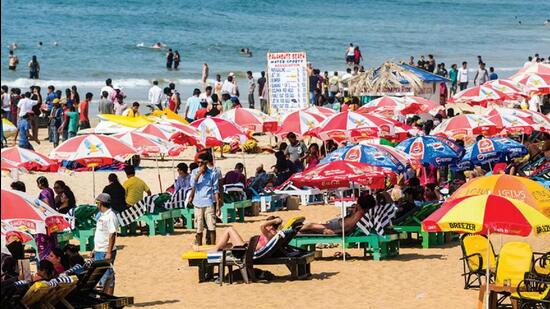
Goa this year is expecting unprecedented tourist numbers in the first season that opens fully after the Covid pandemic. As per official estimates, prior to the pandemic, the state witnessed close to 90 lakh tourists, including around 9 lakh foreigners.
Although tourism is one of the primary sources of income for the state, the authorities this time are planning to impose restrictions, including substantial fines to keep the crowd in control.
The authorities are also planning on strengthening the penal provisions of the law in the popular destinations and beaches where crowds throng the area creating mess, including littering, drinking on the beach and abandoning the bottles there, and cooking along the streets, among others, officials said.
Also Read: Manipur to celebrate Amur Falcon Festival on Monday
“We believe in responsible and sustainable tourism. But there are certain new practices. People come to the beaches, break beer bottles, and leave empty beer bottles. The law was not clear on this so far, so we have issued a notification specifying the banned ‘nuisance activities’ because it is important that they are stopped immediately and we have placed substantial fines,” Tourism Minister Rohan Khaunte said.
Moreover, the local residents, mainly from the capital city of Panaji have complained to the authorities about tourists spoiling the roads, and footpaths in the city including traffic jams and chaos all around.
“Panjimites are angry, frustrated and under a lot of stress, due to different factors like parking, traffic jams, photo shoots by tourists in our residential areas, broken footpaths, potholed roads etc. Our city is not at all healthy. It’s getting sicker and sicker by the day, and yet the government is planning more projects on existing recreational spaces,” Patricia Pinto a former councillor of the Corporation of the City of Panaji said.
Alleging that the government’s entire focus is on gambling, fun and entertainment for revenue generation, Arminio Ribeiro, an architect and town planner, and member of the conservation committee of the Corporation of the City of Panaji raised questions on the future projects planned for the city which eventually will come at the cost of the locals.
Also Read: ₹ 10 k fine over mishap, mandatory registration: New rules for Noida pet owners
“Panaji as a unique cultural and heritage city is ignored. Instead, the entire focus is on gambling, fun and entertainment. As citizens of the city, we are concerned with the chaos from unregulated traffic, loss of our public waterfront spaces, and the image of our city from a heritage city to a casino city,” Ribeiro said.
Locals have also challenged and are up in arms against the Goa Tourism Department’s proposal of converting the children’s park in Panjim into a ‘waste to art park’ saying that tourism promotion will come at the cost of local welfare.
Recreational spaces on the waterfront have already made way for casino lounges, Pinto said.
“...And if the proposed ‘waste to water park’ will be formed, this will mean the best garden in Panjim maintained by the forest department would have a manned ticket entry, would be closed to our children, taking away their play space, and a recreational space where we could relax, rejuvenate, and socialise would be lost to us forever. Nobody has the right to snatch them away from us,” added Pinto.
“Tourists are free to share our space, we welcome them. But developing it for them and locking us out is a definite no,” she said.
The plan was finally withdrawn and will instead be set up elsewhere after opposition, but the capital city is feeling the pressure.
Also Read: AT HTLS 2022, Arvind Kejriwal explains why ‘people don’t want Opposition unity’
The tourism industry, however, said the numbers were a ‘good sign’. “Last year after the pandemic subsided, we had what was called revenge tourism. This year we will be receiving foreign tourists as well, which will help diversify our clientele. We need a diverse set of tourists in order that all categories of stakeholders are satisfied. A lot of small hotels and guesthouses depend on domestic tourists,” the president of the Travel and Tourism Association of Goa said.
“At the same time, we want to promote Goa as a safe and favourable experience for all including those looking for family tourism. It will help if we can keep the beaches clean, and offer different adventure experiences so we can attract the right kind of tourists,” he added.
“If I speak about limitations it will sound like an excuse. We will use our resources to take stringent action,” Police Inspector Dattaguru Sawant of the Calangute Police station said.
But law enforcement agencies admit that resources are stretched.
“In the long run, we have to promote Goa as a quality tourism destination and quality tourists to come into the state which will help us in employment and help the industry in terms of economics. We are equally accountable to our people,” the tourism minister said when asked will the state be able to handle the numbers with Goa set to get a second airport over the coming months bringing more tourists and forming a greater number of destinations.
Goa’s tourism sector is a big source of revenue for the state. The tourism industry in Goa directly contributes 16.43% towards the state’s Gross Domestic Product (GDP) and also provides employment to nearly 35% of the state’s population that is dependent on the sector, according to official estimates.
- Terms of use
- Privacy policy
- Weather Today
- HT Newsletters
- Subscription
- Print Ad Rates
- Code of Ethics
- India vs Sri Lanka
- Live Cricket Score
- Cricket Teams
- Cricket Players
- ICC Rankings
- Cricket Schedule
- Shreyas Iyer
- Harshit Rana
- Kusal Mendis
- Ravi Bishnoi
- Rinku Singh
- Riyan Parag
- Washington Sundar
- Avishka Fernando
- Charith Asalanka
- Dasun Shanaka
- Khaleel Ahmed
- Pathum Nissanka
- Other Cities
- Income Tax Calculator
- Petrol Prices
- UGC NET Answer Key 2024 Live
- Diesel Prices
- Silver Rate
- Relationships
- Art and Culture
- Taylor Swift: A Primer
- Telugu Cinema
- Tamil Cinema
- Board Exams
- Exam Results
- Admission News
- Employment News
- Competitive Exams
- BBA Colleges
- Engineering Colleges
- Medical Colleges
- BCA Colleges
- Medical Exams
- Engineering Exams
- Love Horoscope
- Annual Horoscope
- Festival Calendar
- Compatibility Calculator
- Career Horoscope
- Manifestation
- The Economist Articles
- Lok Sabha States
- Lok Sabha Parties
- Lok Sabha Candidates
- Explainer Video
- On The Record
- Vikram Chandra Daily Wrap
- Entertainment Photos
- Lifestyle Photos
- News Photos
- Olympics 2024
- Olympics Medal Tally
- Other Sports
- EPL 2023-24
- ISL 2023-24
- Asian Games 2023
- Public Health
- Economic Policy
- International Affairs
- Climate Change
- Gender Equality
- future tech
- HT Friday Finance
- Explore Hindustan Times
- Privacy Policy
- Terms of Use
- Subscription - Terms of Use

Home » Sustainable Goa » Eco-Friendly Goa: A Sustainable Paradise of Responsible Tourism and Biodiversity
- Sustainable Goa
Eco-Friendly Goa: A Sustainable Paradise of Responsible Tourism and Biodiversity
- , August 18, 2023

Goa, renowned for its immaculate beaches, lively culture, and lush surroundings, is currently moving toward a more sustainable future. E-friendliness has become increasingly crucial as worries about climate change and environmental damage increase. Examining Goa’s eco-friendly programs, behaviours, and attractions in this context not only provides insight but also serves as an example for other areas to emulate. Goa emerges as a model of sustainable practices, where the preservation of its natural beauty and cultural history takes primacy, as worries about the health of the globe grow more pressing. This article goes deep into Goa’s eco-friendly core, revealing the countless efforts, thoughtful decisions, and peaceful coexistence that are paving the way for future generations to lead greener, more responsible lives.
1. Sustainable Tourism Practices
Goa’s use of s ustainable tourism practices marks a significant change in how the area engages with its environment, culture, and visitors. This strategy aims to achieve a delicate balance between developing tourism and making sure Goa’s ecosystems and communities are sustained over the long term. Goa seeks to reduce negative effects on its natural and cultural resources while enhancing positive contributions through the introduction of sustainability concepts into the tourism industry .
- Responsible visitor management: Responsible visitor management is essential for eco-friendly tourism in Goa to avoid overpopulation and the deterioration of sensitive ecosystems. Goa makes sure that its natural resources are preserved for future generations by actions including limiting access to popular sites, regulating tourism seasons, and promoting less-traveled regions.
- Conservation of Wildlife and Natural Habitats: The preservation of Goa’s various ecosystems is a top priority for eco-friendly tourism. Visitors have the chance to both appreciate and help preserve the state’s abundant biodiversity through wildlife sanctuaries, mangrove conservation initiatives, and guided eco-tours.
- Low-Impact Activities: The tourist activities in Goa are geared toward non-intrusive ways to take in the natural beauty of the island. Visitors can get a close-up look at the area while leaving the least amount of environmental impact by participating in guided nature walks, bike tours, and kayaking excursions.
- Recycling and trash Reduction: Eco-friendly tourist activities include trash management tactics that reduce the use of plastic, support recycling, and coordinate routine beach clean-ups. The natural beaches and marine habitats of Goa are protected through these initiatives.
Goa’s Potential for Sustainable Tourism Practices
- Ecotourism Haven: Goa is a haven for ecotourism thanks to its varied habitats, from the Western Ghats to its unspoiled coastline. The state can attract tourists while preserving its natural beauty by encouraging guided nature walks, animal viewing, and responsible hiking.
- Community Engagement: The vibrant cultural legacy and tight-knit communities of Goa offer chances for really immersive cultural encounters. Participating in regional celebrations, customary crafts, and neighborhood-based projects can promote intercultural understanding and strengthen local economies.
- Mobility Alternatives: Introducing green mobility options, including electric cars and cycle lanes, can lessen traffic congestion and carbon emissions while also improving the entire visitor experience.
- Sustainable Festivals and Events: Working with festival and event organizers to ensure eco-friendly practices can reduce environmental consequences while providing tourists with distinctive experiences.
- Eco-Friendly Accommodations: Goa may adopt sustainable lodging that reduces energy use, reduces waste, and prioritizes eco-friendly amenities, from boutique eco-resorts to homestays. Programs for certification can encourage businesses to follow green guidelines.
Goa’s adoption of sustainable tourism techniques not only demonstrates its dedication to protecting its natural and cultural resources but also serves as an example for other travel destinations throughout the world. A model for a cleaner and more sustainable travel business, responsible tourism works in concert with environmental protection, community involvement, and cultural preservation to guarantee that Goa’s appeal remains.
2. Green Accommodations
The astonishing evolution of Goa’s hospitality industry is at the core of the state’s transformation into an eco-friendly state. To redefine how visitors experience this coastal sanctuary while leaving a kinder ecological impact, the idea of “Green Accommodation” has gained traction. In addition to providing a comfortable place to stay, these eco-friendly lodgings support sustainable practices that align with the state’s dedication to environmental protection and ethical tourism.
- Solar-Powered Retreats: Goa’s eco-friendly lodgings use the region’s plentiful sunshine to run their businesses. Rooftops are adorned with solar panels that transform sunshine into clean energy used to run heaters, lights, and appliances. This strategy not only lowers carbon emissions but also shows how we may live in harmony with the environment.
- Harvesting rainwater: Given Goa’s tropical climate, water conservation is a top priority. Rainwater harvesting systems are now a common feature in eco-friendly lodgings. These systems capture and store rainwater for use in irrigation and toilet flushing, among other things. This method lessens dependency on local water supplies and mitigates water scarcity.
- Energy-Efficient Infrastructure: In environmentally friendly lodgings, sustainable architecture takes center stage. The demand for air cooling and heating is reduced through energy-efficient designs, natural ventilation, and insulating materials, which lowers energy consumption and improves visitor comfort.
- Initiatives for Responsible Trash Management: Goa’s eco-friendly hotels promote ethical trash management. They put a high priority on waste segregation, recycling, and composting to ensure that most of the trash produced is kept out of landfills. This dedication serves as an example for both visitors and the neighborhood.
Goa’s Potential for Green Accomodation
The potential for green lodging in the state is a game-changing chance to provide visitors with more than just a place to rest but also an immersive experience that is in line with sustainable values.
- Integration of Renewable Energy: Goa’s plentiful sunshine can be used to generate solar electricity, while the coastal breezes can be used to generate wind energy. When it comes to implementing renewable energy sources to reduce their carbon impact, green lodging may set the bar high.
- Water Conservation: Using water-saving techniques like wastewater treatment, effective plumbing systems, and rainwater collection can drastically cut water usage and help with resource management.
- Certification and Recognition: Goa’s green lodgings can apply for certifications from organizations like LEED or EarthCheck, giving ecologically aware tourists peace of mind and establishing standards for the sector.
- Research and Innovation: Collaborating with research institutes and groups can result in the creation of cutting-edge sustainable practices and a mindset of constant improvement.
The growth of eco-friendly lodging in Goa is an example of a forward-thinking mentality that places environmental responsibility at the center of the hospitality sector. These accommodations present a concept where luxury, comfort, and sustainability converge, appealing to travelers who are looking for immersive and responsible experiences.
3. Biodiversity in Goa
The state has started ambitious measures to conserve biodiversity because it understands how important it is to preserve this natural wealth. The importance of Goa’s commitment to preserving its ecological resources grows as the demands of development and tourism increase. The state works to strike a healthy balance between development and preservation through several conservation initiatives, protected areas, and community involvement.
Goa’s various landscapes are woven together in an enthralling tapestry by its biodiversity. A global hotspot known as the Western Ghats is home to endemic vegetation and uncommon species like the Malabar Pied Hornbill. Its mangroves provide a sanctuary for animals like the Smooth Otter and Mangrove Pitta, and its coastal waters are teeming with colorful parrotfish and other marine life. Unique species like the Goa’s Torrent Frog flourish in the rivers and streams. Malabar Nut and Gotu Kola are abundant medicinal plants, and the Indian Pitta and Paradise Flycatcher are favorites of birdwatchers. The diversity of Goa includes amphibians and reptiles, including species like the Goan Wrinkled Frog and Shieldtail Snake.
- Creating Wildlife Sanctuaries and Protected Areas: Goa is home to several wildlife sanctuaries and protected areas that serve as havens for various species. These protected areas, like Bondla Wildlife Sanctuary, Cotigao Wildlife Sanctuary, and Bhagwan Mahavir Wildlife Sanctuary, guarantee the conservation of threatened plant and animal species.
- Protection of Endangered Species: Goa places a high priority on safeguarding local, endangered species. The goal of conservation activities is to protect endangered species like the Indian gaur, black panther, giant squirrel, and numerous bird species by securing their habitats and deterring poaching.
- Mangrove and Wetland Conservation: Goa takes action to save these important habitats because it recognizes the biological importance of mangroves and wetlands. Additionally to preserving a variety of marine species, mangroves act as natural barriers against coastal erosion.
- Research and Monitoring Programs for Biodiversity: These initiatives help determine the condition and status of Goa’s biodiversity. Conservationists can create focused strategies to handle new concerns by analyzing ecological changes and population trends.
- Reforestation and Afforestation: Goa works on reforestation and afforestation programs to mitigate habitat loss and deforestation. These programs aid in restoring deteriorated habitats and establishing crucial animal circulation corridors.
- Awareness and Education: It is essential to inform the general people and tourists about the value of conserving biodiversity. Environmental stewardship is encouraged by environmental awareness programs, outdoor education facilities, and protected area visits.
Goa’s Potential for Biodiversity
- Restoration of Degraded Habitats: Wetlands, mangroves, and woodlands are only a few examples of the Degraded Habitats that can be Restored in Goa. These habitats can be revitalized and can support a wide variety of plant and animal species by implementing restoration efforts.
- Protected Areas Expansion: Goa can create safe havens for its distinctive flora and fauna by designating additional protected areas and efficiently managing those that already exist. Future generations can benefit from these ecosystems’ capacity to store biodiversity.
- Management of Invading Species: It’s critical to address the threat posed by invading species. Goa can prevent the spread of non-native species that can disturb regional ecosystems by implementing invasive species management initiatives.
- Wildlife Corridors: By creating greenways and wildlife corridors to connect fragmented habitats, species can migrate freely, promoting genetic variety and lowering the risk of population isolation.
- Native Plant Promotion: Promote the use of native plants in landscaping and urban development to help local wildlife, from birds to pollinators, by creating habitats that will benefit them.
4. Waste Management and Recycling
Waste management and recycling are proving to be essential cornerstones of Goa’s sustainable growth as the city’s pulsating tourism and development scene intensifies. The state is dedicated to protecting its pristine environment with cutting-edge waste management techniques and a growing recycling culture. The state’s landscape is graced by both verdant hinterlands and stunning coastline scenery.
- Effective Waste Collection and Segregation: Goa has made progress in ensuring that various forms of waste are segregated at the source of generation. The state creates the groundwork for efficient recycling by teaching citizens and visitors about responsible garbage disposal.
- Promotion of Recycling Centers: Citizens are invited to take an active role in the recycling process at the recycling centers that dot the Goan landscape. These facilities serve as collection points for recyclable items like paper, plastic, glass, and metals, preventing them from ending up in landfills and fostering their reuse.
- Incentives for Recycling: The introduction of incentives, such as deposit-refund programs for bottles and cans, motivates people to actively engage in recycling initiatives. These programs also instill a sense of accountability and provide financial incentives for waste minimization.
- Public Awareness and Education: Public awareness initiatives and educational initiatives are essential for modifying attitudes and routines. Goa sows the seeds for a greener future by teaching the next generation through schools and community activities.
Goa’s Potential for Waste Management and Recycling
Goa has the untapped potential to completely transform waste management and recycling techniques amidst its magnificent landscapes and vibrant culture.
- Infrastructure for Advanced Recycling: Goa has the ability to remove huge volumes of waste from landfills by building cutting-edge recycling facilities suited to handle a variety of materials, from plastics to electronic waste.
- Source Separation Programs: By putting in place efficient source separation programs at homes and businesses, you can increase recycling rates, lower contamination, and prevent recyclables from ending up in landfills.
- Waste-to-Energy Conversion: Goa may want to look at waste-to-energy technology that may turn non-recyclable waste into clean energy. This will help the state with its energy demands while lowering landfill waste.
- Public-Private Partnerships: By working together with private businesses and waste management specialists, it is possible to make use of resources and knowledge to develop comprehensive waste management solutions.
Goa’s enormous potential illuminates the way to lasting development. The state can not only protect its natural and cultural legacy but also set an example for sustainability on a global scale by embracing innovation, encouraging partnerships, and cultivating a shared vision for a greener future.
5. Community Involvement
Goa’s effort to become more environmentally friendly is driven by the potent force of citizen involvement. The state’s thriving communities are working together to create a future that is more ecologically sensitive and sustainable. Each community has its distinct cultural heritage, traditions, and goals. The people of Goa are playing a crucial part in establishing a peaceful coexistence between people and nature via cooperation, education, and shared responsibility.
- Local leaders and initiatives: Communities in Goa are launching grass-roots campaigns to promote sustainable lifestyles. These committed people are igniting change from the ground up, from local clean-up campaigns to cooperative organic farming. Moreover, Encourage local leaders to start neighborhood cleanliness programs and tree-planting efforts to demonstrate the power of group effort.
- Environmental Education: Schools and community organizations in Goa are increasingly becoming hubs for environmental education. Young and old inhabitants are taught the value of eco-friendliness and their part in preserving the region’s natural beauty through workshops, seminars, and awareness campaigns.
- Cultural Celebrations for Sustainability: Goa’s diverse cultural heritage provides a venue for honoring environmentally responsible behaviors. Festivals and events are increasingly including sustainability themes, highlighting the relationship between custom and ethical behavior.
- Online activism and social media: Digital platforms help groups communicate, exchange ideas, and organize for environmental causes. Online initiatives, informational drives, and virtual clean-up activities magnify neighborhood efforts and encourage wider participation.
Goa’s Potential for Community Involvement
- Grassroots Initiatives: Goa’s local communities can launch neighborhood cleanup drives, tree-planting initiatives, and waste-reduction programs, showcasing the tremendous impact of group action on enhancing local ecosystems.
- Community-based tourism: The people of Goa can provide visitors with genuine, immersive experiences that showcase local culture, customs, and sustainable lifestyles while bolstering the local economy.
- Collaborative Restoration Projects: To improve local ecosystems, communities can work together to restore damaged landscapes, plant trees, clean up waterways, and restore wildlife habitats.
- Advocacy and Policy Influence: Communities can voice their issues, offer answers, and influence legislation through collective lobbying to make sure environmentally friendly factors are incorporated into development plans.
Goa is a heartwarming example of how community involvement and environmental friendliness work together to develop a place. People are not only creating a greener Goa as they come together to conserve the area’s natural beauty, cultural legacy, and quality of life, but they are also providing a reassuring model for international sustainability initiatives.
6. Eco-Adventure and Recreation
Goa, which is tucked away between the scenic coastline and verdant hinterlands, attracts adventure seekers to discover its plethora of natural wonders through eco-friendly activities . Travellers are invited to interact with Goa’s breathtaking landscapes through eco-adventure and recreation, which encourages environmental awareness and conservation.
Eco-adventure and leisure act as a vibrant link between the natural world and the human experience. They give the following major advantages:
- Environmental Awareness: Getting up close and personal with nature helps people appreciate Goa’s different ecosystems more. This knowledge fosters a sense of obligation to protect the environment.
- Eco-adventure activities create tourism revenue while reducing adverse effects on the environment. This is known as sustainable tourism. By encouraging visitors to preserve and safeguard natural regions, this type of tourism ensures their continued existence.
- Health and Well-Being: Spending time outdoors and engaging in physical activity can help to improve both mental and physical health. It provides a means of unwinding, decompressing, and reviving.
- Cultural Exchange: As a result of interactions with local people during eco-adventure activities, tourists might learn about folklore, traditional ways of life, and indigenous knowledge.
Goa’s Potential in Eco-Adventure and Recreation
Goa’s diversified landscapes and rich cultural past make it an exceptional destination for eco-adventure and recreation :
- Beach Activities: Goa is a mecca for water-based eco-adventures like kayaking, snorkelling, and stand-up paddleboarding thanks to its magnificent coastline. The beauty of its coastal ecosystems is highlighted by these activities, which support marine conservation.
- Trekking: The Western Ghats feature routes that run through lush woods, waterfalls, and attractive villages, making them the perfect setting for hiking and trekking. These pursuits promote exploration while assisting neighbourhood organizations.
- Wildlife Encounters: Birdwatching, animal photography, and escorted nature hikes are all possible in Goa’s wildlife sanctuaries. Diverse species can be observed by eco adventurers in their natural settings, aiding in conservation efforts.
- Cycling and eco-tours: T ravelers can get a close-up look at local culture with cycling excursions across Goa’s picturesque countryside. These trips also assist rural economies and encourage sustainable transportation.
- Adventure Sports: The terrain in Goa is ideal for activities like rock climbing, rappelling, and zip-lining, which offer an adrenaline rush while promoting environmental responsibility.
7. Culinary Sustainability
Goa invites food lovers to go out on a culinary adventure that extends beyond tastes and scents. An integral part of the state’s cultural tapestry, culinary sustainability weaves together regional customs, eco-friendly methods, and mouthwatering products to produce a dining experience that not only tempts the palate but also protects the environment.
Sustainability in food extends beyond the dinner table and provides a number of important benefits.
- Preservation of Culinary Legacy: Using traditional cooking methods and locally available ingredients guarantees that Goa’s diverse culinary legacy will be preserved, protecting traditional recipes for coming generations.
- Reduction of Food Waste: Sustainable culinary practices emphasize mindful eating and inventive ingredient use, which reduces food waste and has a good influence on the environment.
- Support for Local Economy: Giving locally sourced food priority and working with small-scale farmers helps the local economy, builds up neighborhoods, and encourages sustainable farming.
- Environmental protection: Reducing the use of single-use plastics and acquiring sustainable seafood are two eco-friendly actions that the food business may do to lessen its environmental impact.
Goa’s Potential for Sustainable Culinary Practices
Goa’s rich agricultural resources and diversified food culture make it an ideal location for sustainable food production:
- Local Ingredients: A vast range of fruits, vegetables, and herbs may grow in Goa’s tropical climate. A unique and sustainable dining experience is made possible by using local resources in culinary creations.
- Seafood Sourcing: Goa can prioritize sustainable fishing methods and ethical seafood sourcing thanks to its coastal position. This encourages marine conservation while providing seafood lovers with a delicious and moral option.
- Farm-to-Table Movement: Fostering relationships between neighborhood farmers and eateries encourages the use of local, seasonal vegetables. Farm-to-table programs reduce the carbon emissions caused by moving food.
- Traditional Cooking Workshops: Workshops that teach traditional cooking techniques and place a focus on locally accessible foods can be incorporated into tourism experiences to promote culinary sustainability.
- Zero-Waste Restaurants: Goa has the potential to adopt the zero-waste mentality, in which eateries prioritize minimizing food waste and put composting and recycling procedures into place.
Discover more from Incredible Goa
Subscribe to get the latest posts sent to your email.
Type your email…
Follow us...
Trending....

How to Increase Your Success When Day Trading

Unlocking the Power of Fasting: How It Can Transform Your Health, Strength, and Youthfulness

5 Google AI Tools to Make Your Travels Easy, Breezy, and Secure

How Ride-Sharing Apps are Revolutionising Goa’s Tourism Landscape

Escape the Tourist Traps: Top 5 Hidden Gems to Explore in Goa Beyond the Beaches

Celebrating Krishna Janmashtami in Goa: A Blend of Tradition and Devotion
Latest news.

Renowned Chef Floyd Cardoz, Co-Owner of Bombay Canteen with Goan Roots Dies of Coronavirus

While the Senior Citizens Bear the Brunt of Taxi Strike in Goa, Locals Create Social Media Group to Help Tourists

Employment Policy will Focus on Job Reservation to Goans

Tourist Makes Video and Post Online After Local Taxi Drivers Forced him out of GoaMiles Taxi at Five Star Hotel in South Goa

Life of Expats in the Gulf is not so Rosy Anymore

Model Code of Conduct, What is it and How it affects the Common Man

Bonderam – Goa’s Famous Festival of Flags To Held online This Year

Boosting Goa’s Presence on Wikipedia – Goan Wikipedians Team Gets To Work

Abandoned Tourism Complex in Kavlem Turns Into Ruins; Government Turns a Blind Eye!

NICMAR Holds Techno-Cultural Festival “INKARNO-2K17 at Farmagudi Campus

AirAsia Offers Lounge Services to its Guests Across all Airports

Punjab-Based Casino Operator To Be The New Owners Of Goa’s Iconic Nightclub “Tito’s”- Read The Whole Story Here

Top 10 Goan Churches with Baroque Architecture

Diverse New Year Festivities in Goa: A Cultural Mosaic

Goa Witness A Stiff Rise in Breast and Colon Cancer Cases

Goa’s Ex-MLA and Noted Poet Vishnu Wagh is No More

Understanding the world of Online Dating

Celebrating The International Yoga Day With Yoga Trainer And Fitness Enthusiast Vrinda Kanani
© 2020 Incredible Goa - All rights reserved
Made with ❤ by Goa Prism Digital Media
Subscribe now to keep reading and get access to the full archive.
Continue reading
- Jun 20, 2022
Impact Of Tourism On Goa
Updated: Jun 14, 2023
The stress-busting vacation hub Goa is under severe environmental and social threat.

There is no denying that Goa's splendid and scenic beaches, sun and sand, and the architectural splendour of its Goan temples, churches, and Old Portuguese houses have made it a favourite tourist destination for travellers from around the world. Under Portuguese rule for more than four centuries, Goa's geographical boundaries such as the Sahyadri range and the tidal rivers have attracted people and created a unique identity for its citizens. With its long history of meeting races, cultures, and religions of East and West over the centuries, Goa offers a multifaceted and distinct way of life where people of all religions live in peace with each other. A blend of Portuguese and Roman influences, the Goan cuisine is full of flavour and mouthwatering. Goan people are friendly and hospitable, aiding this state in truly becoming a ‘Tourist's Paradise’.
Currently, tourism is the state's most important economic activity and trade, hotels, and tourism have a multiplier effect on the local economy. In terms of income, output, employment, and foreign exchange generation, the tourism sector has contributed to the growth of the service sector-driven economy. Tourism contributes 18 percent of Goa's net state domestic product, and 14 percent of foreign currency earned in the country.
Today’s picture of Goa is a true marvel of the process of globalisation. However, this cradle of intercultural mingling and coastal aesthetics is not hidden from the damaging effects humans tend to bring everywhere they go. Some of th e wounding effects of the thriving tourism industry of the state have been the commercialisation of tradition, dilution of identity, destruction of heritage sites, etc. In addition to this, there has been a dark culture of substance abuse, human trafficking and alcoholism germinating in the state, among other things. Sadly, Goa is frequently wrongly portrayed as the place for cheap, easy access to alcohol, drugs, and s ex - and many tourists flock on over to the state simply because of this. Due to the incorrect portrayal of Goa as an idyllic holiday destination for sun, sand, and sex, the image of women there is negatively affected. When tourism is expected to help women from host regions advance socially and increase employment opportunities, the reality is different. Observations by the Centre for Responsible Tourism in Goa showed that 31.3% of women working in the state tourism sector feel unsafe at their workplace.
(Also Read: The True Cost of Luxury )
Because the tourist sector tries to maximise its commercial interests at the expense of the environment, fast and unregulated tourism expansion has caused permanent environmental harm. Some of the major issues of Goa tourism include over-utilized waste disposal facilities, dumping of solid and liquid wastes, insufficient implementation of deterrent measures against beach pollution, water bodies, and environmentally sensitive regions, and violations of coastal zone control. The carrying capacity of Goa's water resources has been exceeded, and tourism-related activities have impacted the water resources in several coastal places. Uncontrolled marine tourism and water sports have irreversibly harmed coastal ecosystems. Tourism imposes a strain on transportation infrastructure, and the present infrastructure is insufficient to accommodate the travel needs of both tourists and resident communities. Littering and waste production have become big issues. The current trash management system is insufficient, and local administrations have been trying to handle the increasing rubbish created by visitors. In Goa, there is no mechanism in place to manage and recycle massive amounts of liquid and solid garbage created by the tourism sector. Overbuilding and extensive paving of shorelines have also resulted in serious habitat destruction and disruption, such as the destruction of nesting areas for sea turtles in certain beach areas in Pernem, such as Morjim, and Galgibag, one of the most famous nesting grounds in Canaconataluka.
(Also Read: 17 Reasons Why Drugs Are A Sustainability Issue )

The government of Goa released the Goa Tourism Policy in 2019 to put the pedal to the metal of the objectives of the Goa Tourism Master Plan which was released in 2016. Under this policy, the government aims at making tourism in Goa environmentally and socially sustainable, i.e., ensuring the proper promotion of ecologically safe and environmentally conscious tourism infrastructure and making the tourism sector safe for the tourists and the residents. Other than this, the state has made conscious efforts towards minimising emissions. A great example of this is the influx of electronic buses being injected into the public transport system of the state.
(Also Read: How To Be A Sustainable Tourist )
Aside from this, NGOs can play a significant role in mobilising the concerns of the local communities with regard to their physical and social environment and putting pressure on the institutions that can amend the harmful activities. Thus, NGOs need more governmental support since they are key to voicing the demands of the grass-root level population.
That being said, more stringent, guided and planned steps need to be taken by the government in order to preserve the ecological, cultural and social integrity of this coastal state. Tourists can actually help by adhering to the guidelines that are there set in place, and by making the conscious decision of not going to the state during peak seasons.
Achrekar, G. (2020, October 31). Tourism Development in Goa: Trends, Importance and Challenges. International Journal of Multidisciplinary in Management and Tourism , 3 (1).
https://so03.tci-thaijo.org/index.php/ijmmt/article/view/247618
Falleiro, S. P. (2015). The Economic and Socio-Cultural Balance Sheet of Tourism in Goa: Future Options. International Journal of Scientific and Research Publications , 5 (2). https://www.ijsrp.org/research-paper-0215/ijsrp-p3815.pdf
Government of Goa. (2020). Goa Tourism Policy 2020 .
https://www.goa.gov.in/wp-content/uploads/2020/11/Goa-Tourism-Policy-2020.pdf
Salgaonkar, S. P., & Salgaonkar, P. (2017). ROLE OF PANCHAYAT IN SUSTAINABLE TOURISM: INSIGHTS FROM GOA. International Journal of Tourism and Travel , 10 (1).
https://www.iittmjournal.org/wp-content/uploads/2019/01/IITTM-Jrl.Vol_.10-2017.pdf#page=61
Venugopalan, T. (2021). Tourism and Sustainability in India –Exploring Sustainability of Goa Tourism from the Perspective of Local Community. European Journal of Business and Management Research , 6 (3).
https://www.ejbmr.org/index.php/ejbmr/article/view/852
- Climate & Conservation
- Lifestyle & Culture
Recent Posts
Fast fashion: ruining the world one crop-top at a time
Can nature’s first line of defense help save our beaches?
How To Be A Sustainable Tourist
- Screen Reader
- Skip to main content
- Text Size A
- Language: English
- Case Studies
- EXIM Procedure
Media & Events
- Image Gallery
- Media Coverage
Other Links
- GI of India
- Experience India
- Indian Trend Fair 2022
- India Organic Biofach 2022
- Gulfood Dubai 2023
The tourism industry in Goa directly contributes 16.43% to the state's GDP and employs ~35% of the state's population.

Goa State Report
Introduction.
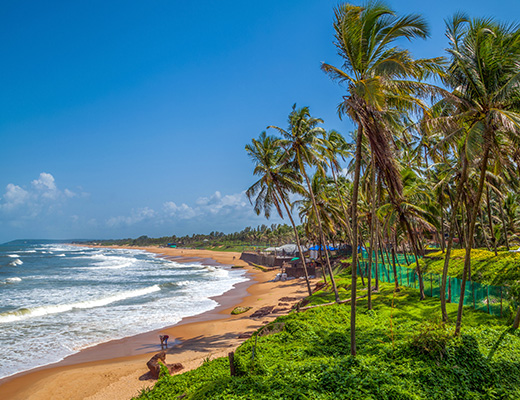
Goa is located on the west coast of India. The state shares its borders with the Arabian Sea to the west, Maharashtra to the north, and Karnataka to the south and the east. It is traditionally known as a tourist paradise for its natural scenery, unique beaches, and cultural diversity.
Goa's economic growth is driven by the strong performance of its industrial sectors such as fishing, agriculture, tourism, and pharmaceuticals.
At current prices, Goa’s Gross State Domestic Product (GSDP) (budget estimate) Goa’s Gross State Domestic Product (GSDP) (budget estimate) is expected to stand at Rs. 1,21,309.02 crore (US$ 14.65 billion) in 2024-25 and stand at Rs. 1,00,002.25 crore (US$ 12.87 billion) in 2023-24. At current prices, Goa’s Gross State Domestic Product (GSDP) was Rs. 914.16 billion (US$ 11.15 billion) in 2022-23. The GSDP (in Rs.) increased at a CAGR of 9.17% between 2016-17 and 2024-25.
In 2022-23, the Gross Value Added (GVA) growth was estimated at 4.73% for the primary sector, 6.52% for the secondary sector, and 9.66% for the tertiary sector. In 2021-22, the secondary sector accounted for 52.06% of the Gross State Value Added (GSVA) at current prices, followed by the tertiary sector at 40.10% and the primary sector at 7.84%.
As of FY24, Goa had a total installed power generation capacity of 649.11 MW, of which thermal power plants accounted for a significant share in the total installed capacity with 559.96 MW, whereas nuclear and renewable energy contributed 41,68 MW and 45.47 MW, respectively. Goa is one of the few states in India to achieve 100% rural electrification.
Goa has a well-developed social, physical, and industrial infrastructure and virtual connectivity. It has an international airport that is in line with its importance as a globally recognised leisure destination. It also has significant port infrastructure. The state has an established base for the pharmaceuticals industry and an emerging destination for knowledge-based industries such as biotechnology and IT.
Merchandise exports from the state in FY24 stood at US$ 2.39 billion, and in FY25 (till May 2024) stood at US$ 0.37 billion. Drugs And Pharmaceuticals were the most exported items, with a 51% share in FY24. Engineering Goods, Organic and Inorganic Chemicals, Electronic Goods and Marine Products were the other key export commodities from Goa.
According to the Department for Promotion of Industry and Internal Trade (DPIIT), Foreign Direct Investment (FDI) inflow in the state stood at US$ 165.21 million between October 2019-March 2024.
Recent Developments in Key Sectors:
- In November 2023, the elevated road (Patradevi to Bambolim, the Porvorim stretch) is expected to be 5.2 km long and is expected to resolve the traffic blockage along this section of the NH-66 leading to Panaji and improve access to the Mopa airport. Once complete, the project will allow vehicles to drive at 80-100 kmph as against the current 40-60 kmph.
- In October 2023, 110 teachers from 39 disciplines from higher education institutes got training in digital education.
- In September 2023, Goa Shipyard Ltd (GSL) and Mormugao Port Authority (MPA) are in talks to ink the MoU for the redevelopment of berth no. 9 during the Global Maritime India Summit in Mumbai.
- In FY24 (till September 2023), Goa airport handled 3.42 million passengers and movement of 22,370 aircraft.
- In FY24 Goa airport handled 6.87 million passengers and movement of 44,180 aircraft and handled 6,098 MT of freight.
- In March 2023, to improve the 4G mobile network in the state, the cabinet decided to provide 2,000 sq. feet of space on government land for BSNL. The state government has received a request from BSNL for granting free Right of Way (ROW) permission to lay optical fibre cables (OFC) in planned locations as well as a no-objection certificate (NOC) for towers in 70 locations under the 4G saturation project.
- Goa Chief Minister Mr. Pramod Sawant announced that the state government has set a goal to ensure 100% renewable energy usage across all sectors by 2050. The government has committed to produce 150 MW of green energy over the next two years, with 100 MW solar power facilities being built around Goa.
- The 14th Clean Energy Ministerial and 8th Mission Innovation meeting (CEM14/MI-8) was held in Goa in July 2023.
- The Ministry of Tourism hosted the fourth G20 Tourism Working Group meeting and Tourism Ministerial Meeting in Goa in June 2023.
- On June 3rd, 2023, Prime Minister Mr. Narendra Modi flagged Goa’s first Vande Bharat Express from Madgaon railway station.
- In March 2023, the Goa government announced the building of a cancer institute in the state. The minister met officials from Mumbai-based Tata Memorial Hospital in Panaji to discuss ways to set up a facility to treat cancer patients in the state.
- Goa becomes the country's first 'Har Ghar Jal' certified state. All 2.63 lakh rural households of Goa now have access to drinkable water via a tap connection.
- In December 2022, the Prime Minister inaugurated the Mopa International Airport, Goa. It is developed at a cost of around Rs. 2,870 crore (US$ 350.36 million).
- Union Minister Mr. Nitin Gadkari announced that the work on the Mumbai-Goa highway will be completed by December 2023.
- In November, 2022, the Indian Coast Guard laid the keel for two Coast Guard Pollution Control Vessels, GSL Yard 1267 & 1268, at the Goa Shipyard. The two Pollution Control Vessels were designed and constructed in-house by the Goa Shipyard and are scheduled to be delivered in February and August 2025, respectively.
- In October 2022, the Government of Goa signed a MoU with four startups - Navgurukul Foundation for Social Welfare (Haryana), Newton School (Bengaluru), Beunlu Pvt Ltd (Haryana), and ENTRI (Kerala). The goal is to provide at least 1,000 young people from the state with skills and employment assistance.
- In September 2022, Chief Minister Mr. Pramod Sawant launched “MANDAVI” (Mentoring and Nurturing Digital and Virtual Initiatives). He stated that the Mandavi Channel would offer students the chance to continue their education and finish their courses online if they are unable to complete direct courses.
- According to Industries Minister Mr. Mauvin Godinho, Goa anticipates at least Rs. 5,000 crore (US$ 606.85 million) in investments from the Invest Goa 22 Summit, along with the creation of 14,000 jobs.
- As of July 2022, Goa has seven formally approved and three notified special economic zones (SEZs). However, there are no operational SEZs in the state and no in-principle-approved SEZ.
- Under the Credit Linked Subsidy Scheme vertical of PMAY-U, one demonstration housing project of Rs. 5.54 crore (US$ 0.71 million) has been approved by the Government of India which will accommodate 51 homeless persons. This project will come up in Chimbel on the land provided by Provedoria.
- In July 2021, The Department for Promotion of Industry and Internal Trade (DPIIT) selected Forum for Innovation Incubation Research & Entrepreneurship (FiiRE), a Goa-based start-up, to provide funding under the ‘Start-up India Seed Fund’ scheme to accelerate innovation in the state’s start-up ecosystem.
- In July 2021, the state government announced its plan to outsource e-government projects to local IT firms to boost the IT sector in Goa.
- In June 2021, the state governments of Goa and Kerala collaborated with Convergence Energy Services Limited (CESL) to procure >30,000 two and three-wheeler electric vehicles (EVs) and accelerate the adoption of EVs in the country.
- In July 2021, Goa issued the draft ‘Goa Electric Mobility Promotion Policy, 2021’, proposing all two-wheelers to switch to electric by 2025. The state plans to provide subsidies for 11,000 EVs for the next five years (until 2025).
- In May 2021, Goa Chief Minister Mr. Pramod Sawant launched a solar-based electrification program for rural households in the state. This project will bring electricity through renewable energy to areas in Goa where grid connectivity is not feasible.
- On February 7, 2021, Union Fisheries Minister Mr. Giriraj Singh announced an investment of Rs. 400 crore (US$ 55.30 million) in Goa. These funds will be used to improve the fishing infrastructure of the state.
- A second greenfield international airport is being developed in Mopa, Goa with an annual capacity to handle 30 million passengers by phase IV.
- A new export policy for the state is also being prepared to promote exports of manufactured goods and surplus agricultural produce.
- Union Ministry of Home Affairs (MHA) has identified five islands in Goa, namely St George Island, Grande Island, Pequeno Island, Conco Island and Bhindo Island to carry out holistic development.
Geographical Area (sq km)
State language, literacy rate, key industries:, food processing, it and ites, biotechnology, pharmaceuticals, related sites, related news.
India's EV adoption is thriving, with three-wheelers leading at 53.61% and Goa achieving the highest state penetration at 14.20%, signalling a promising shift towards sustainable transportation.
Housing prices in India's top 30 Tier II markets have risen dramatically by up to 94% in the last 4 years due to surging demand, reports PropEquity.
Prime Minister Mr. Narendra Modi interacted with healthcare workers and beneficiaries of the COVID vaccination programme in Goa.
Food Corporation of India supplies 31.80 LMT free food grains to a States/ UTs under PMGKAY scheme.
Tourism sector witnesses a slow and gradual hiring trend with a hope of surge in domestic travel on the back of opening of the economy.

Not a member
Academia.edu no longer supports Internet Explorer.
To browse Academia.edu and the wider internet faster and more securely, please take a few seconds to upgrade your browser .
Enter the email address you signed up with and we'll email you a reset link.
- We're Hiring!
- Help Center

GOA TOURISM IMPACTS

Related Papers
Shahab Ahmed
F M Nadaf Nadaf
In the 21st century, tourism has become an indispensable component of for any economy. Tourism has a huge potential to bring economic development due to its multiplier effects. Similarly, tourism also plays a vital role in the socio-cultural integration of a country and brings great changes in the local population with regard to jobs, income, standard of living, exchange of culture, ideas etc. Tourism is vital to the Economy of Goa. All these years more emphasis was given to the development of beach tourism. As a result of which, beaches of Goa are intensively used and abused in the last half a century. Hence, for the sustainable development of tourism in Goa, there is a need to promote nature based tourism. This paper which is largely based on secondary information, explores the possibilities of taking tourism beyond the golden, sunny and sandy beaches of Goa.
IJSRP Journal
Tourism is an important activity that has been present across the world for ages. Notwithstanding its numerous merits and benefits, tourism has its weaknesses and shortcomings too. This paper attempts to provide a balance sheet of the economic and socio-cultural impacts of tourism on Goa, a state in India known for its relatively tourism-centric economy. Based on the same and on experiences drawn from other tourism dependent regions across the country and the world, the paper draws a list of options for Goa for the future – options that would minimize the problems created by unplanned tourism while at the same time extracting the maximum that planned and responsible tourism can offer.
Kalidas Sawkar
Frederick Noronha
Dr Suresh Kumar Kundur
nitesh ugavekar
Tourism, as a social event, brings a transformation in the society, due to long guest, host association but many times, tourist destinations remain as image unique cultural identity. Goa, a beach tourist destination in India, is one of the most preferred tourist destination that has witnessed the pros and cons of tourism. Therefore, this paper aims to assess the perceptions of cultural change at selected tourist destinations of South Goa district, Goa- India. The following study is purely field based, where in 337 responded were surveyed through a questionnaire at six coastal tourist destination, where tourism is the prime activity. The analysis reveals that majority of the respondents agree that there is positive as well as negative impacts due to tourism. Further, Factor analysis resulted in four tourism-related factors: Cultural Enhancement, Adverse Effects and Economic Developments & Threat to the local culture.
Introduction The Maldivian archipelago located 500 km from southern tips of both India and Sri Lanka. Is a beautiful string of 1,190 low-laying coral islands scattered across the equator in the vast expanse of the Indian Ocean, giving us a rare glimpse of what is aptly described as tropical paradise. Just consider this sparkling white sunkissed beached, crystal-clear lagoons studded with profusely colored corals; azure warm seas with an undisturbed exotic marine life palm-fringed island the providing serenity all of it summarized by the famous Moroccan traveler Ibn Battuta on describing Maldives as “one of wonders of the world”
International Journal of Hospitality & Tourism Systems
Publishing India Group , Ling-Chen Chang
To strategically utilize resources to minimize the negative impacts of tourism and increasing the social support for tourism development, the present study examined the residents of the State of Goa by using the model developed by Perdue et al. (1990); later extended by Mc Gehee, et al. (2002); and also based on social exchange theory; tried to determine whether personal characteristics and personal benefits from tourism influence perception of tourism as well as support for tourism development, and what factors influence support for tourism development and management. The result indicated that personal characteristics were not good predictors of resident's attitude tourism impacts with an exception of age, education, and birthplace. Personal benefits from tourism predicted positive impacts of tourism, negative impacts of tourism and also support for additional tourism, which was consistent with Perdue et al. (1990) and Mc Gehee et al. (2002).The research supported social exchange theory as personal benefit and support for additional tourism were significant predictors of tourism planning. However, while support for additional tourism did predict tourism planning, it showed a positive relationship as reported by Mc Gehee et al. (2002) and not a negative one as reported by Perdue et al. (1990). The overall findings support previous assertions that educating local residents about the potential benefits of tourism is critical in obtaining their support for tourism, enhancing their involvement in the industry, and achieving sustainable community development.
RELATED TOPICS
- We're Hiring!
- Help Center
- Find new research papers in:
- Health Sciences
- Earth Sciences
- Cognitive Science
- Mathematics
- Computer Science
- Academia ©2024
- LIVE DISCOURSE
- BLOG / OPINION
- SUBMIT PRESS RELEASE
- Advertisement
- Knowledge Partnership
- Media Partnership
- Law & Governance
20th MSDC Concludes with Historic Milestones and Future Projections for India's Maritime Sector
The 20th maritime state development council in goa resolved over 80 critical issues, announced major port projects, and launched key initiatives to modernize india's maritime sector. the two-day event featured significant contributions from central and state governments, aiming for infrastructure modernization, enhanced security, and sustainable maritime growth..
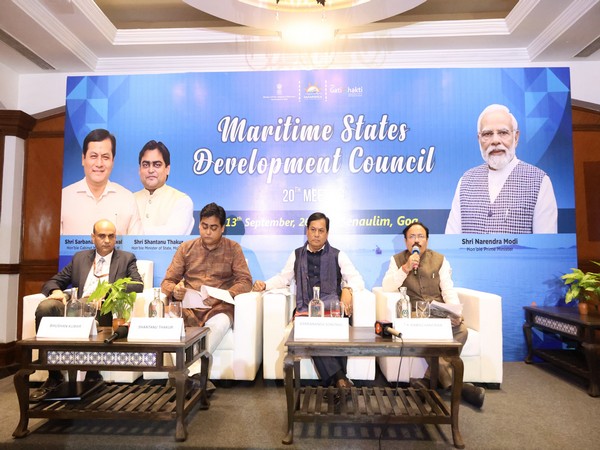
The 20th Maritime State Development Council (MSDC) in Goa concluded on Friday, marking substantial advancements for India's maritime sector. The event, held over two days, resolved over 80 critical issues discussed among central and state governments, focusing on port infrastructure, connectivity, statutory compliances, maritime tourism, and sustainability.
Key issues addressed included the establishment of Places of Refuge (PoR) for ships in distress, developing radioactive detection equipment (RDE) at ports, and recognizing seafarers as essential workers. Additionally, a state and port ranking system was discussed to foster competition and performance improvements.
Union Minister Sarbananda Sonowal, MoS Shantanu Thakur, Goa Minister Aleixo Sequeira, and other dignitaries highlighted MSDC's role in aligning policies and promoting initiatives like the Indian Ports Bill and the Sagarmala program. Sonowal emphasized the importance of non-major ports, the newly designated major port projects in Maharashtra and Andaman & Nicobar, and ongoing Sagarmala projects aimed at substantial infrastructure development.
At the event, the launch of the NSPC application on the National Single Window System platform was announced to streamline regulatory processes, alongside plans for a Mega Shipbuilding Park. The Indian International Maritime Dispute Resolution Centre (IIMDRC) and Indian Maritime Centre (IMC) were also launched to support dispute resolution and strategic planning in the sector.
The event included the keel laying ceremony for India's largest dredger and presentations on maritime innovations from various boards. The meeting also touched on the National Maritime Heritage Complex (NMHC) in Gujarat, aiming to promote India's maritime heritage through global collaborations. The MSDC set a robust agenda, aiming for continued growth and significant contributions to the nation's economy.
Tragic Death in Goa: Boy Killed by Unleashed Pit Bull
Ronald lamola highlights crucial role that norway plays in aiding sa's development goals, goa governor's compassionate aid highlights commitment to public welfare, bournemouth goalkeeper neto joins arsenal on loan, aaron ramsdale joins southampton in high-profile goalkeeper swap.

SEBI Chief and Husband Denounce Malicious Allegations in Joint Statement

S Jaishankar Reflects on 1984 Plane Hijacking, Links to Netflix's 'IC 814'

Trio Accused of Assaulting Minor Girl in Uttar Pradesh

Piyush Goyal Chairs Third Meeting of Reconstituted Board of Trade, Launches ...
Opinion / blog / interview, powering the future: decarbonizing economies with new energy transition models, zambia’s path to universal health coverage: a mixed journey of progress and challenges, the race to net zero: how critical minerals could shape a just energy transition, navigating an uncertain future: how trade unions are using foresight to stay relevant, latest news, devendra fadnavis discusses reinduction of eknath khadse, praises government's agricultural reforms, stoltenberg says nato could have done more to prevent ukraine war, fas reports, top tennis stars withdraw from korea open, debate over renaming ravenshaw university gains momentum.

Connect us on
- ADVERTISEMENT
- KNOWLEDGE PARTNERSHIP
- MEDIA PARTNERSHIP
- Agro-Forestry
- Art & Culture
- Economy & Business
- Energy & Extractives
- Law & Governance
- Science & Environment
- Social & Gender
- Urban Development
- East and South East Asia
- Europe and Central Asia
- Central Africa
- East Africa
- Southern Africa
- West Africa
- Middle East and North Africa
- North America
- Latin America and Caribbean
OTHER LINKS
- Write for us
- Submit Press Release
- Opinion / Blog / Analysis
- Business News
- Entertainment News
- Technology News
- Law-order News
- Lifestyle News
- National News
- International News
OTHER PRODUCTS
Email: [email protected] Phone: +91-720-6444012, +91-7027739813, 14, 15
© Copyright 2024
Maritime council approves plans for huge shipbuilding park spanning many states at Goa meet
The 20th maritime state development council meeting, which concluded in goa on friday, also saw the resolution of more than 80 critical issues between the union government, states and union territories..


IMAGES
COMMENTS
Explore the key takeaways from GITM 2024, where stakeholders gathered to discuss Goa's tourism future. Discover innovative strategies, economic prospects, and sustainable growth initiatives.
Day two of the Goa International Travel Mart (GITM) 2024 witnessed an array of insightful discussions and engaging sessions, further solidifying Goa's position as a premier tourism destination. The day kicked off with a riveting panel discussion and sessions by panelists G B Srithar, Head of Tourism Services, VFS Global, Carl Vaz, President, SKAL International India and Chairman & CEO ...
The highly anticipated Goa International Travel Mart (GITM) 2024 commenced at Dr. Shyama Prasad Mukherjee Stadium from 3-4 th April, witnessing the presence of prominent industry leaders, government officials, and tourism enthusiasts. A notable focus of this year's GITM is on regenerative tourism, a paradigm shift towards sustainable practices that prioritize the restoration and ...
The Goa International Travel Mart ( GITM) 2024 began with a grand inaugural ceremony at Bay 15, Dona Paula, followed by an eventful first day at Dr Shyama Prasad Mukherjee Stadium, showcasing a promising future for Goa's tourism industry.
Goa is gearing up to become the world's premier destination for TourismTech startups, thanks to Goa Tourism Accelerator, a programme of FiiRE (Forum for Incubation, Innovation, Research, and ...
The Goa Tourism Development Corporation (GTDC) recently stated their intention to look towards China, to increase tourism in the state. With the Goa tourism industry now facing the biggest challenge in its 50+ year history, due to plummeting footfalls, and now exacerbated by COVID-19 pandemic; does the GTDC have the right idea by encouraging Chinese visitors?
UNWTO, as the knowledge partner of India's G20 Presidency, has developed the Goa Roadmap for Tourism as a Vehicle for Achieving the Sustainable Development Goals.
assets. The Government of Goa has developed the Goa Tourism Master Plan, 2016 („GTMP 2016‟) to harness the full potential of its tourism sector and to address existing challenges in a systematic manner. The Goa Tourism Policy 2019 („GTP 2019‟, „the Policy‟) provides the enabling framework for implementation of the GTMP 2016.
Connecting Tourism Globally at GITM 2024 The curtains rose on the eagerly awaited Goa International Travel Mart (GITM) 2024, ushering in a new era of possibilities and opportunities for the global tourism industry. Set against the vibrant backdrop of Dr. Shyama Prasad Mukherjee Stadium, the event commenced with palpable excitement, drawing together a diverse gathering of industry leaders ...
Tourism Goa focussing on regenerative tourism and much more: Rohan Khanute Goa Tourism Minister Rohan Khaunte has stated that the state is set to enhance its tourism offerings with innovative attractions like a 3D statue of the Lord Parashuram, other iconic monuments and a World Class Oceanarium.
The coastal state of Goa has asked for public views, objections, and suggestions on the draft of the Goa Tourism Promotion and Management Bill, 2024. The bill aims to look at various aspects of ...
As prices in Indian destinations such as Goa have risen, foreign travel has become a more appealing option, she said. "Sometimes we are spending Rs20,000 [$240] on a domestic trip, so why not ...
Regenerative Tourism This approach seeks to maintain the status quo by balancing economic, social, and environmental considerations. It aims to meet the needs of the present without compromising the ability of future generations to meet their own needs. Sustainable tourism focuses on minimizing negative impacts and often involves conservation, responsible resource use, and community engagement.
April 4, 2024 The second day of the Goa International Travel Mart (GITM) 2024 showcased a series of insightful discussions and engaging sessions, further reinforcing Goa's stature as a premier tourism destination. With a focus on industry trends, challenges, and opportunities, the day provided a platform for key stakeholders to come together and chart the course for Goa's tourism sector.
Dipping occupancy and ARR levels post-pandemic saw many standalone hotels in Goa down their shutters. What does this bode for the state's hospitality sector?. What does the future hold for Goa's tourism business?. Coronavirus lockdown, COVID-19 pandemic, Goa tourism, Goa Tourism Development, hotel assets, moratorium. Business.
Goa's tourism sector is a big source of revenue for the state. The tourism industry in Goa directly contributes 16.43% towards the state's Gross Domestic Product (GDP) and also provides ...
Discover how Goa is embracing eco-friendly practices, from sustainable tourism and green accommodations to biodiversity conservation and waste management. Explore community involvement, eco-adventure options, Goa, renowned for its immaculate beaches, lively culture, and lush surroundings, is currently moving toward a more sustainable future.
The Tourism Industry of Goa: Current Status and Future Potential. by. (Dr. Dayanand M.S., Senior Lecturer, Department of Management Studies, Goa University) Introduction. Tourism as an activity or as a phenomenon has been existing since the olden days. The quest travel often quoted as the "travel bug" is apart of human psyche.
Currently, tourism is the state's most important economic activity and trade, hotels, and tourism have a multiplier effect on the local economy. In terms of income, output, employment, and foreign exchange generation, the tourism sector has contributed to the growth of the service sector-driven economy. Tourism contributes 18 percent of Goa's ...
Get detailed economic information about Goa. Know about the GDP, industry, economy, opportunities, and key growth sectors of Goa.
Tourism is an important activity that has been present across the world for ages. Notwithstanding its numerous merits and benefits, tourism has its weaknesses and shortcomings too. This paper attempts to provide a balance sheet of the economic and socio-cultural impacts of tourism on Goa, a state in India known for its relatively tourism ...
Tourism in Goa. The state of Goa, in India, is famous for its beaches and places of worship. Tourism is its primary industry, and is generally focused on the coastal areas of Goa, with decreased tourist activity inland. Foreign tourists, mostly from Europe, arrive in Goa in winter, whilst the summer and monsoon seasons see many Indian tourists.
The 20th Maritime State Development Council (MSDC), Goa, concluded on Friday with remarkable outcomes for India's maritime sector, with deliberation and resolution of over 100 issues from various ...
While Goa's geographical location improves domestic demand for tourism, it has also lead to a large influx of labor from adjoining states, further exasperating social impacts. Conflicts over resource use and institutional responses to them is another area in which the experiences of Goa and the Maldives differ.
The 20th Maritime State Development Council (MSDC) in Goa concluded on Friday, marking substantial advancements for India's maritime sector. The event, held over two days, resolved over 80 critical issues discussed among central and state governments, focusing on port infrastructure, connectivity, statutory compliances, maritime tourism, and sustainability.
Goa: The 20th Maritime State Development Council (MSDC) in Goa concluded on Friday with remarkable outcomes for India's maritime sector, including plans for a huge shipbuilding park spanning ...